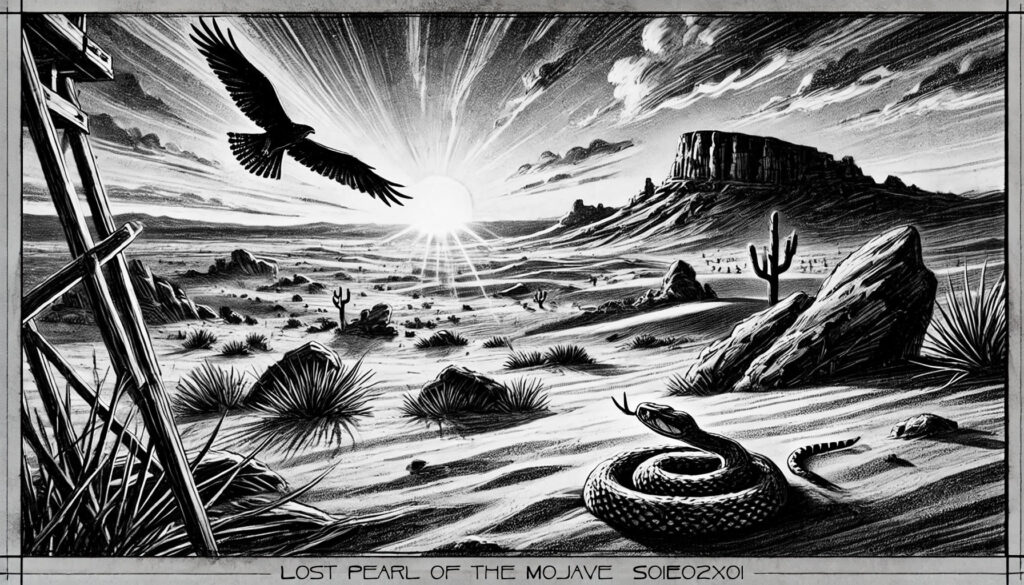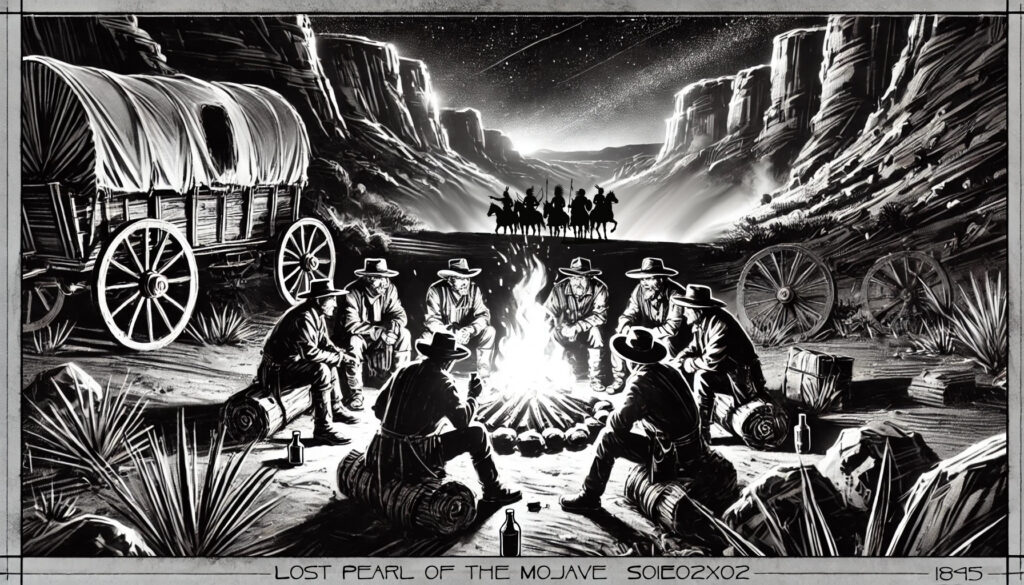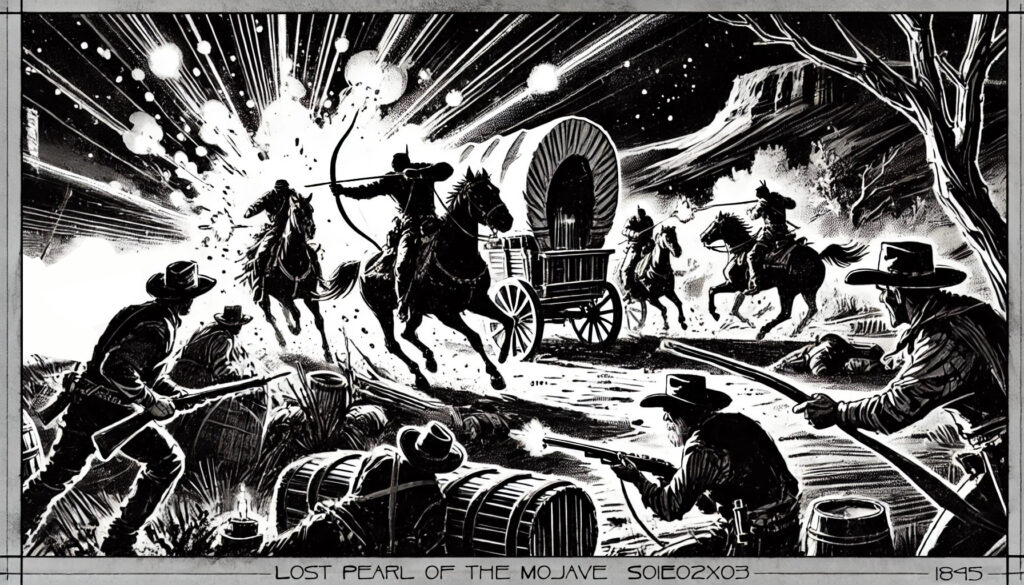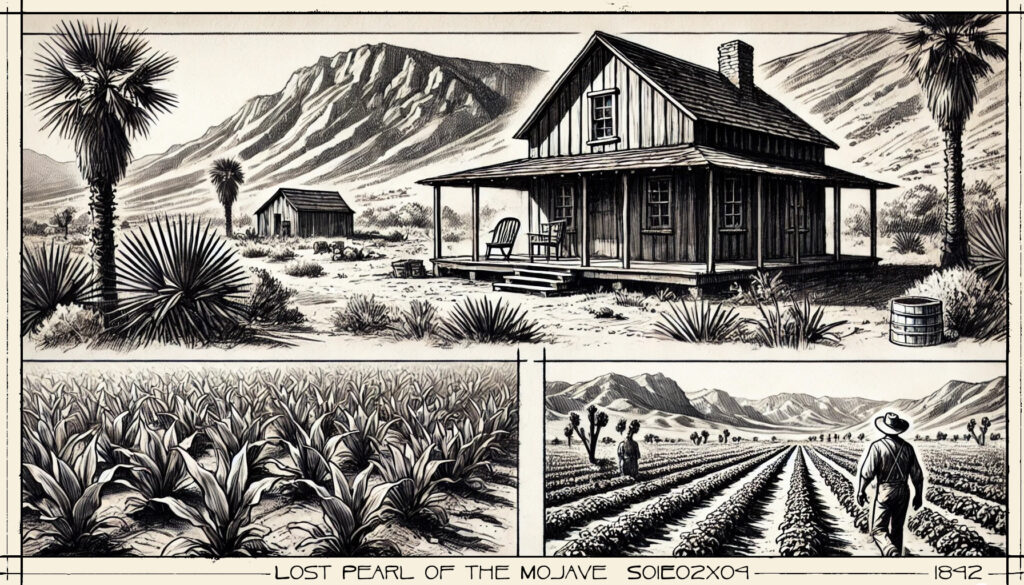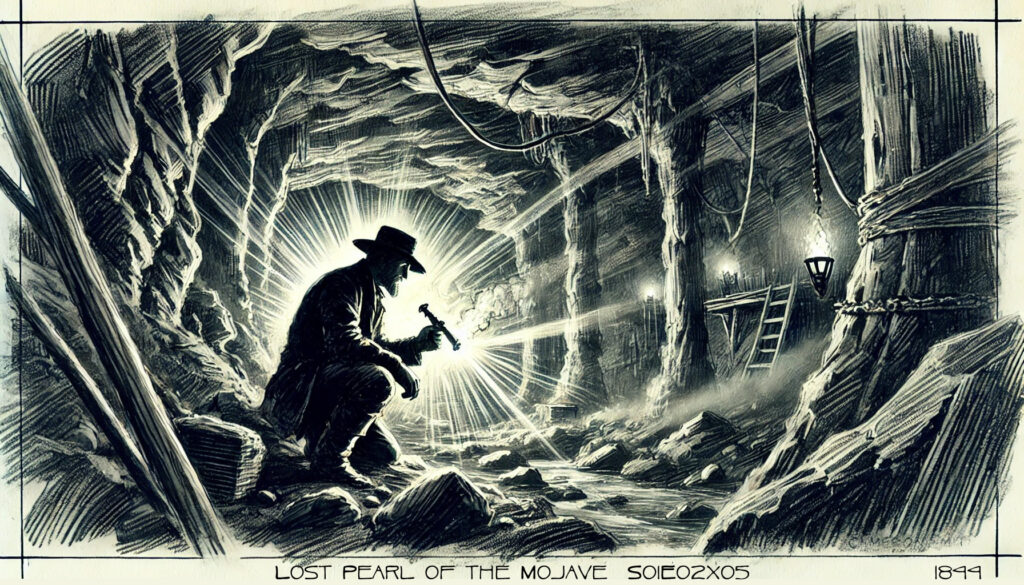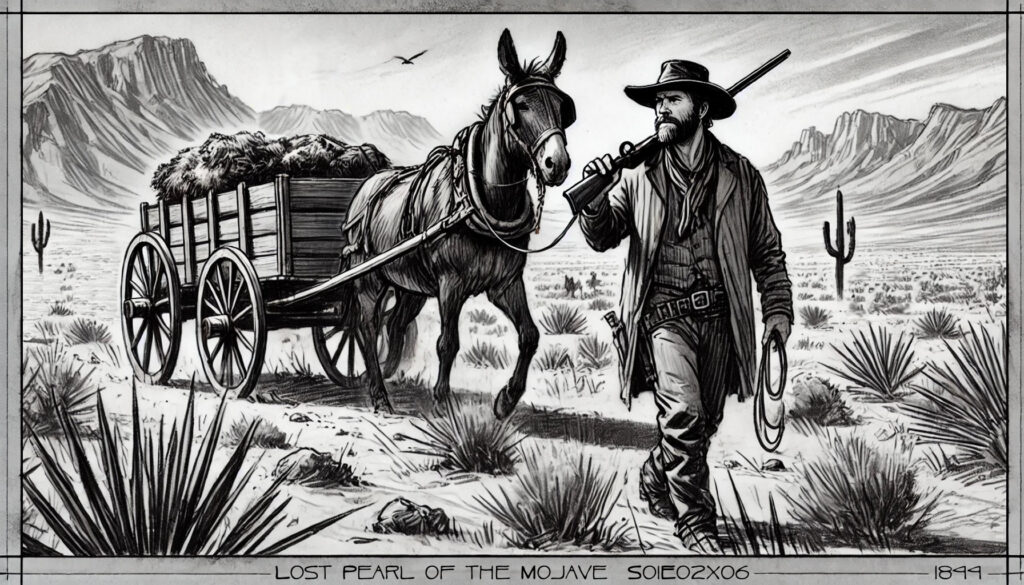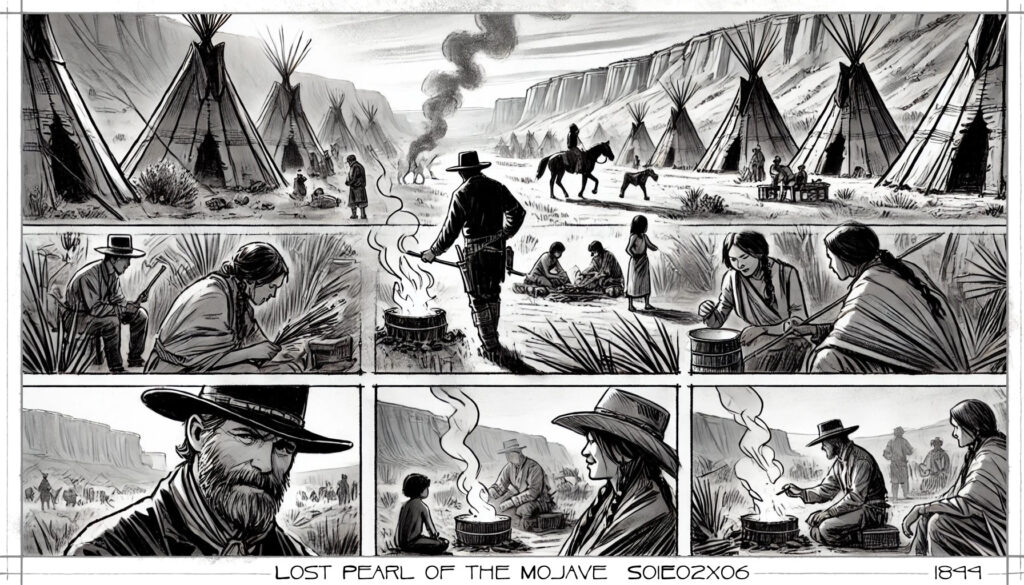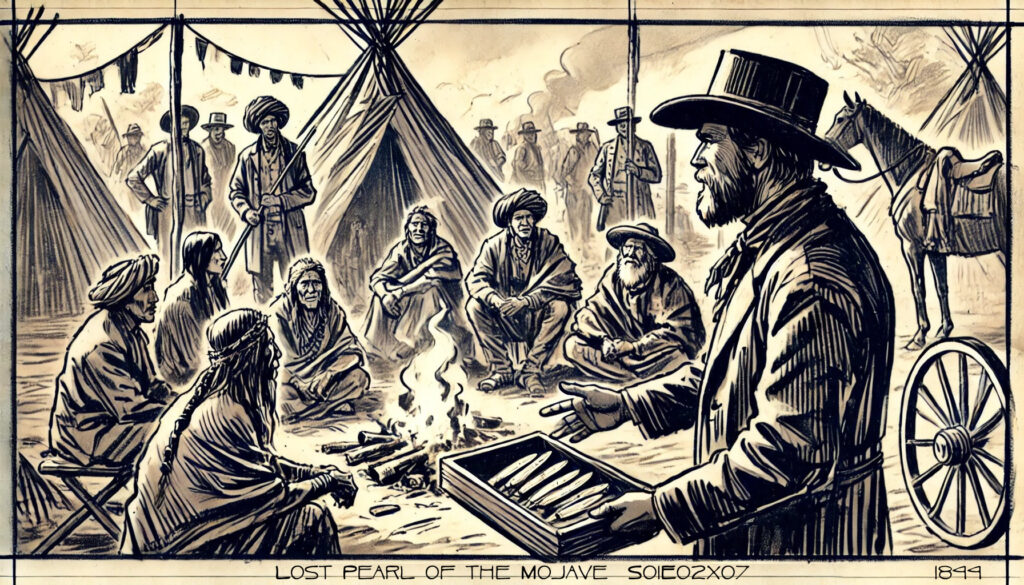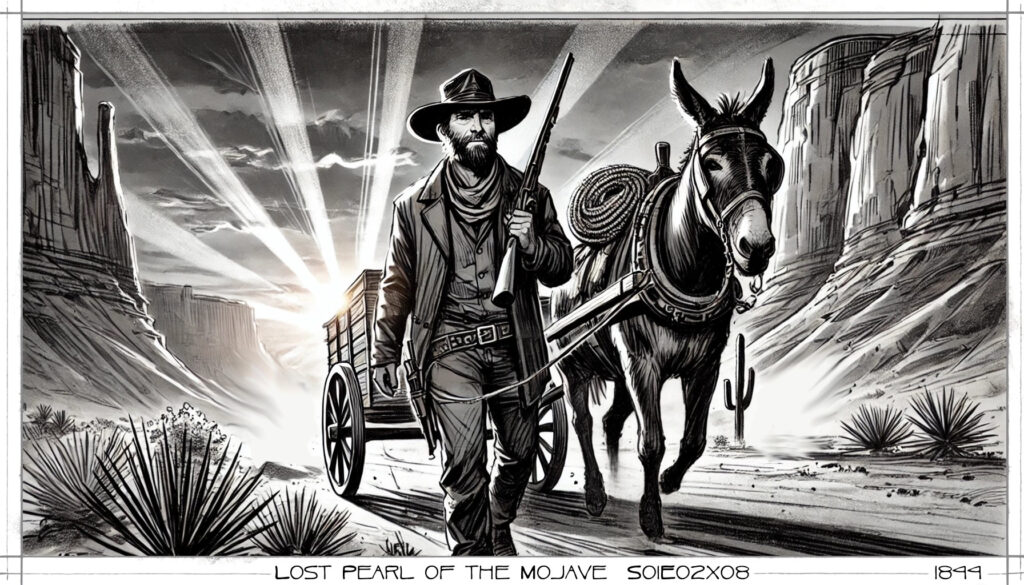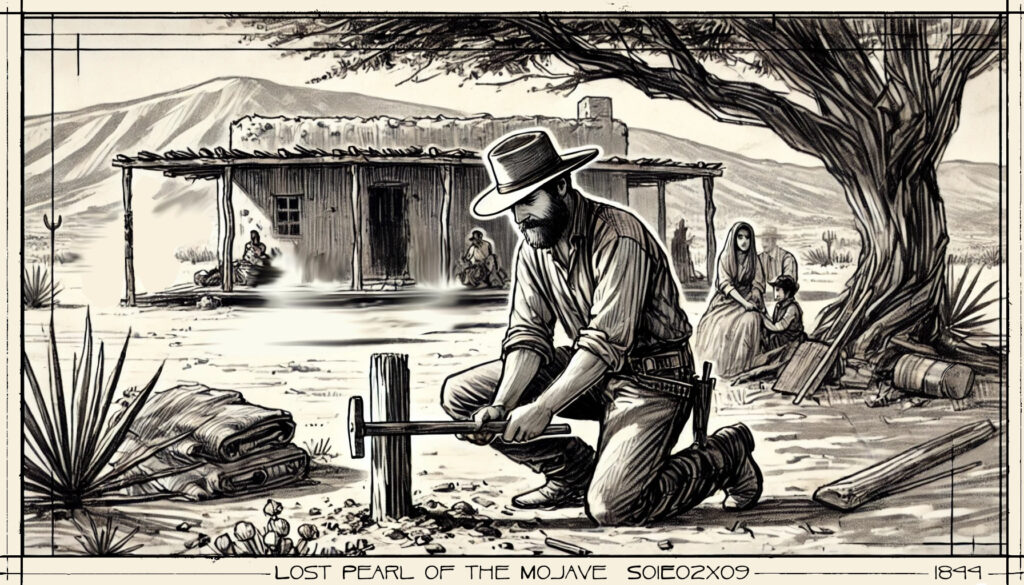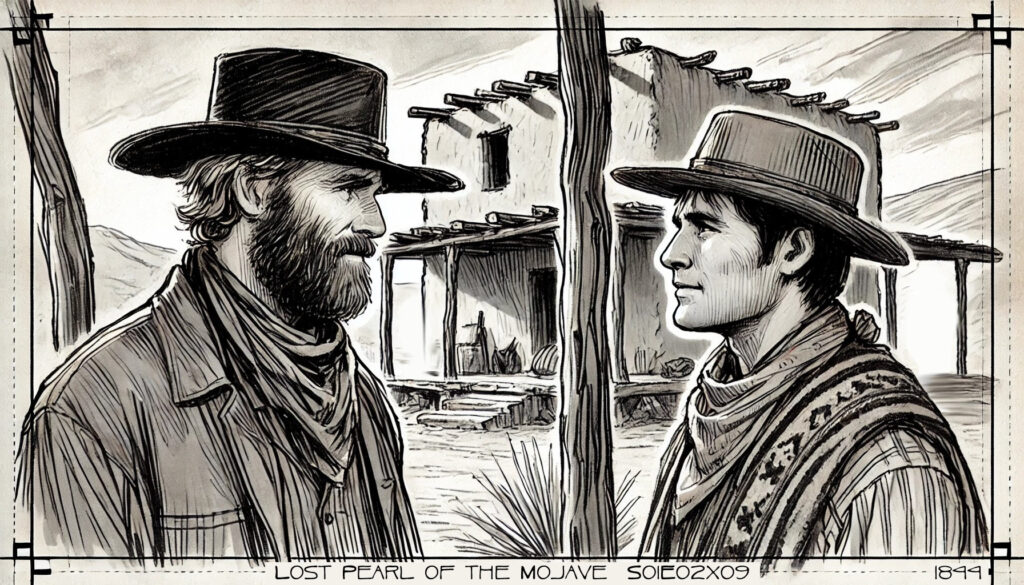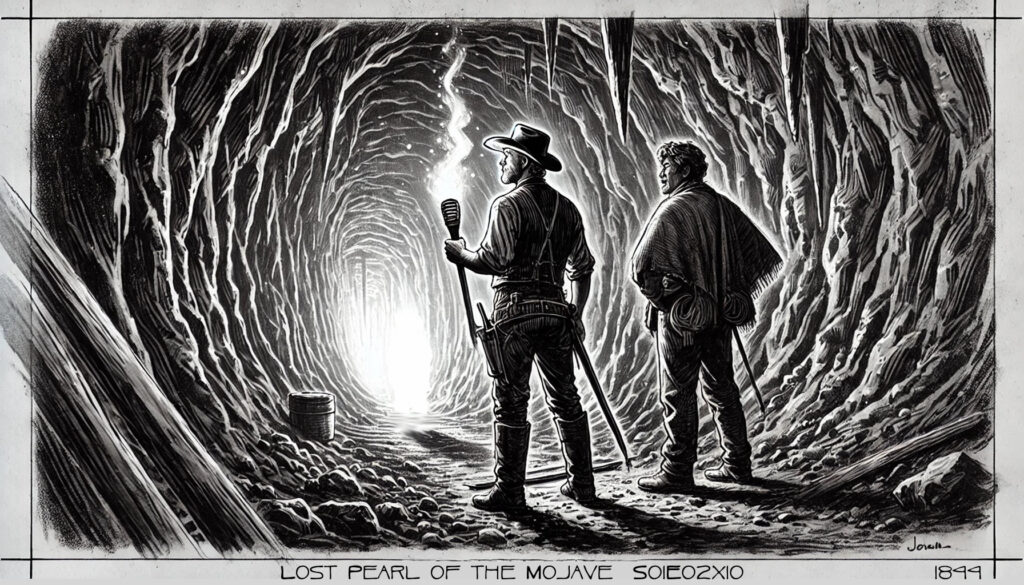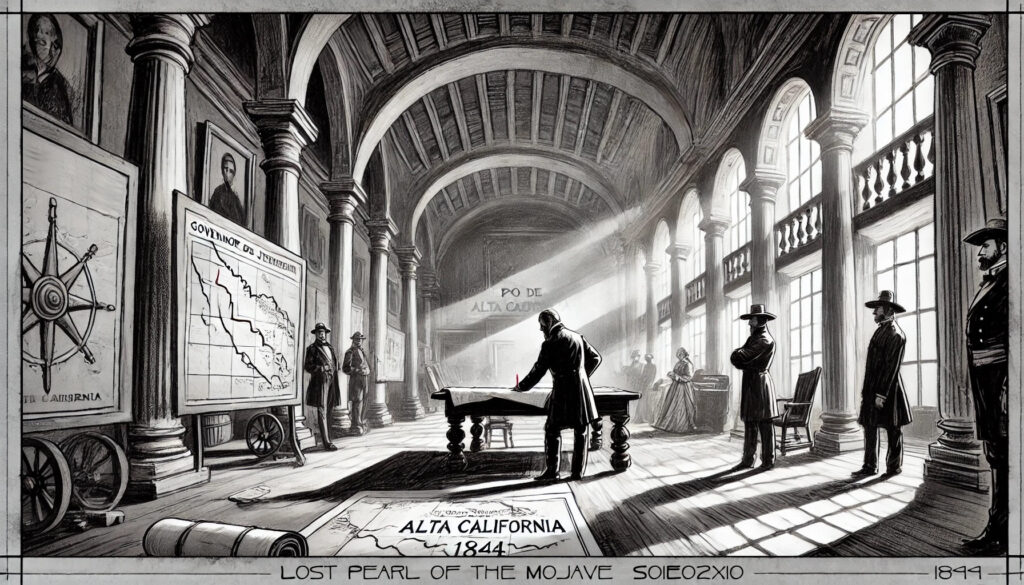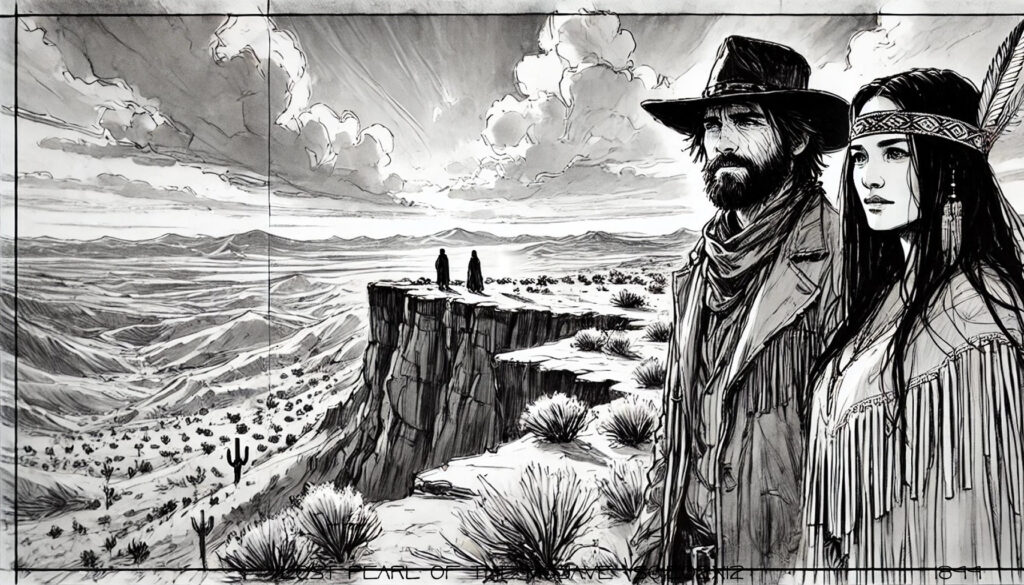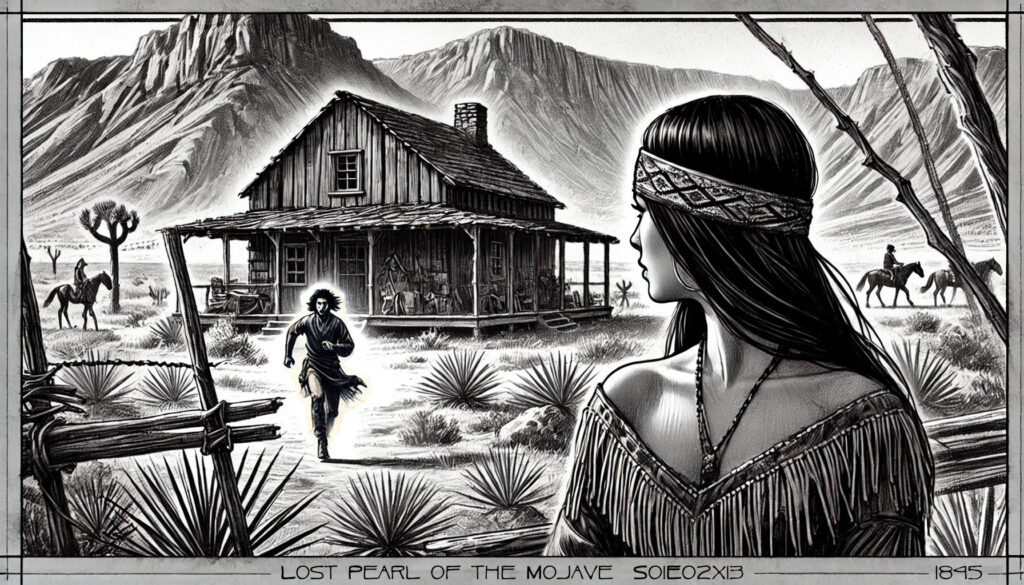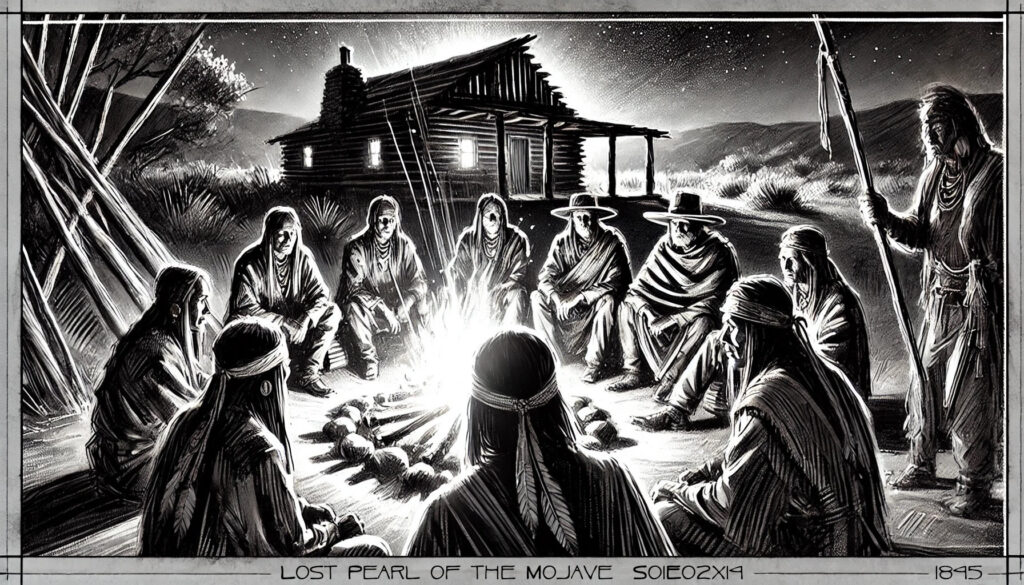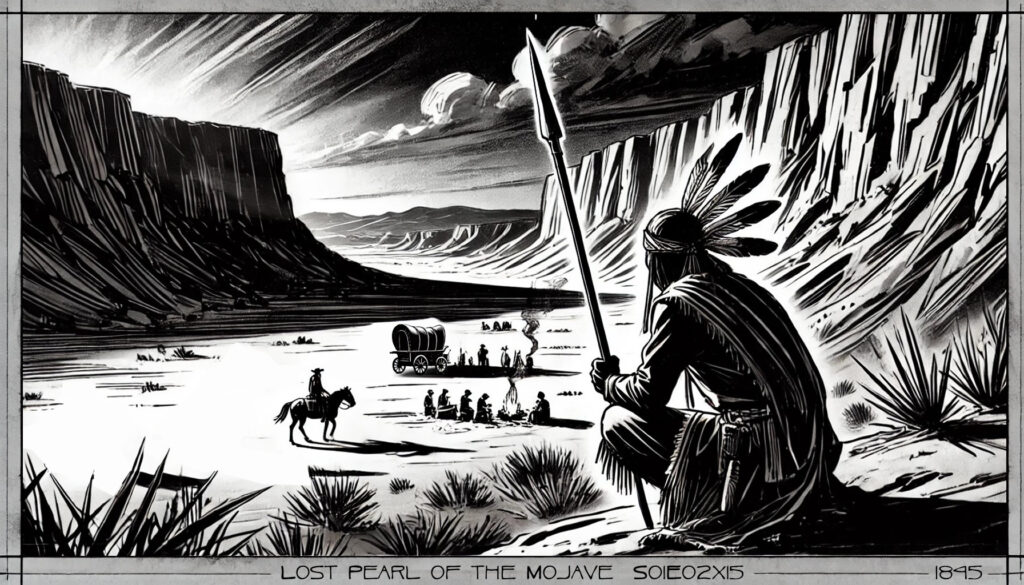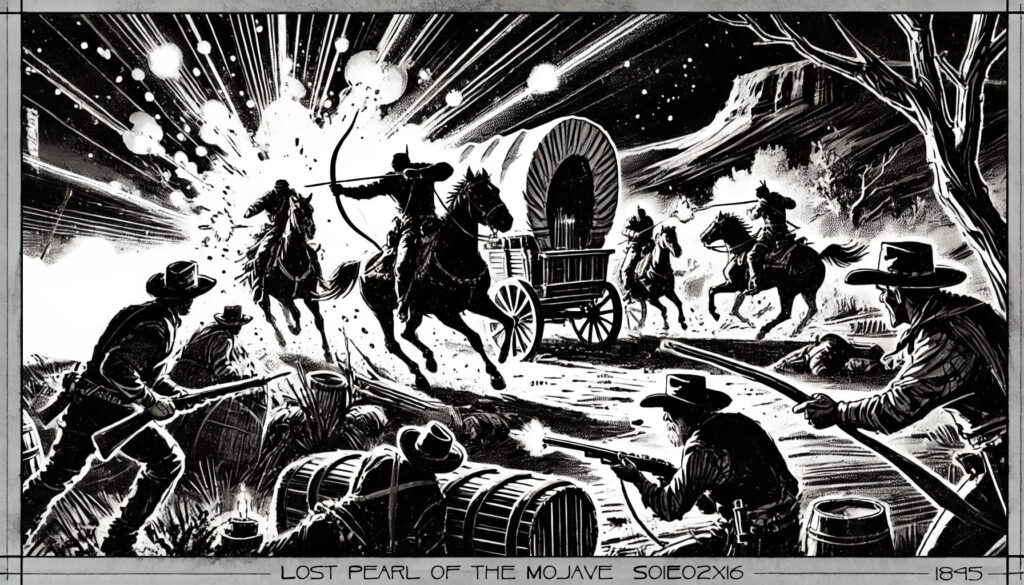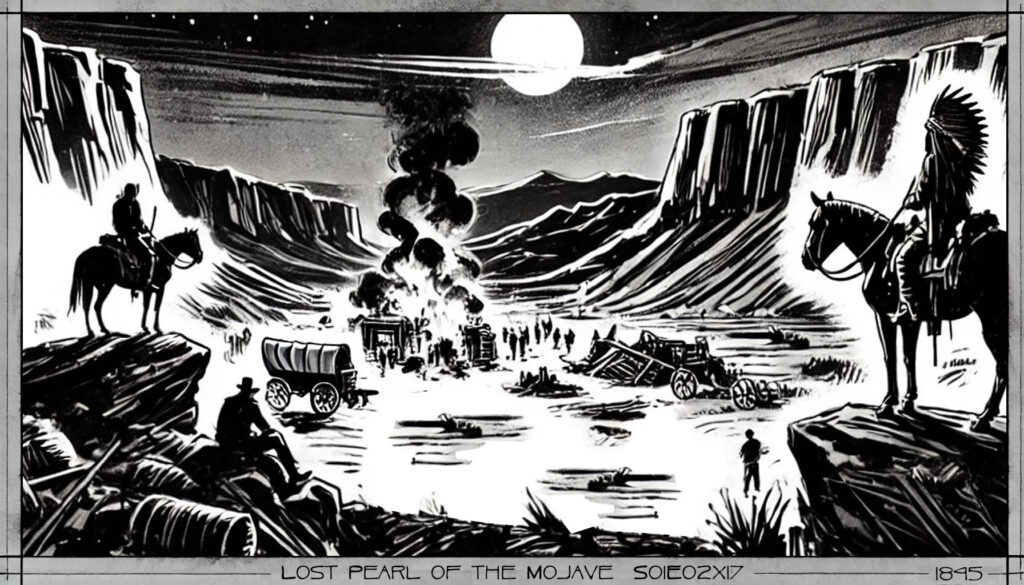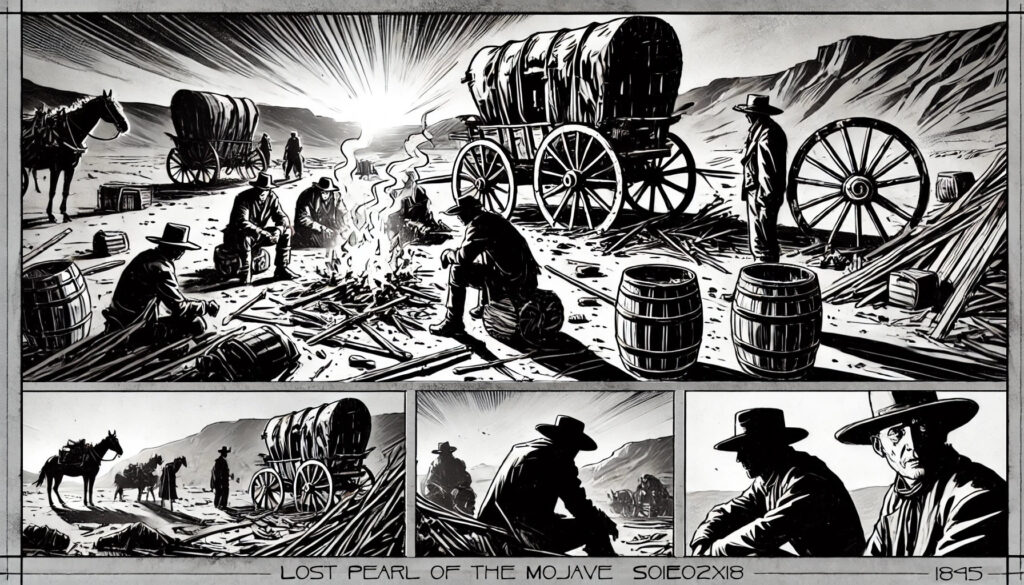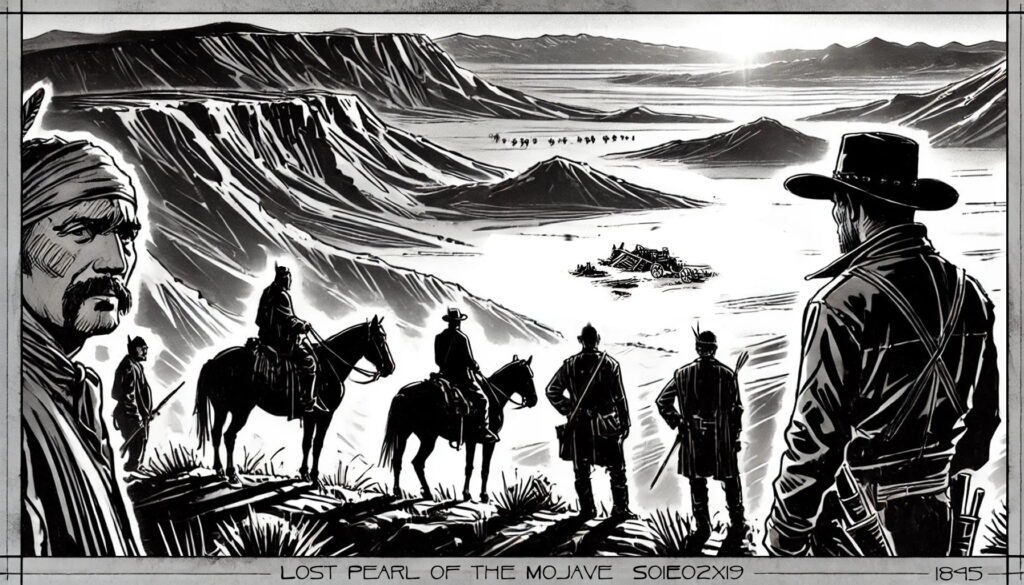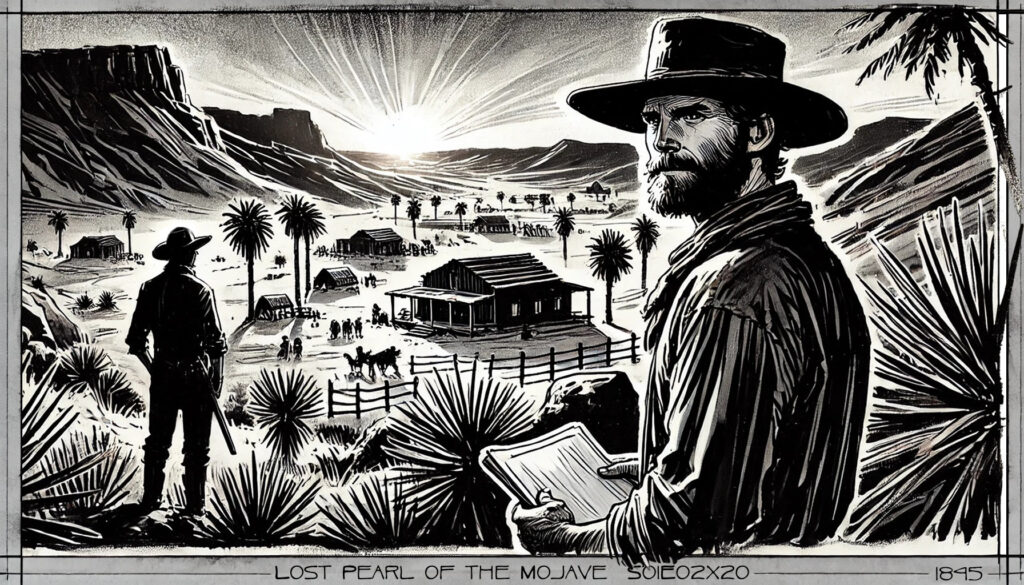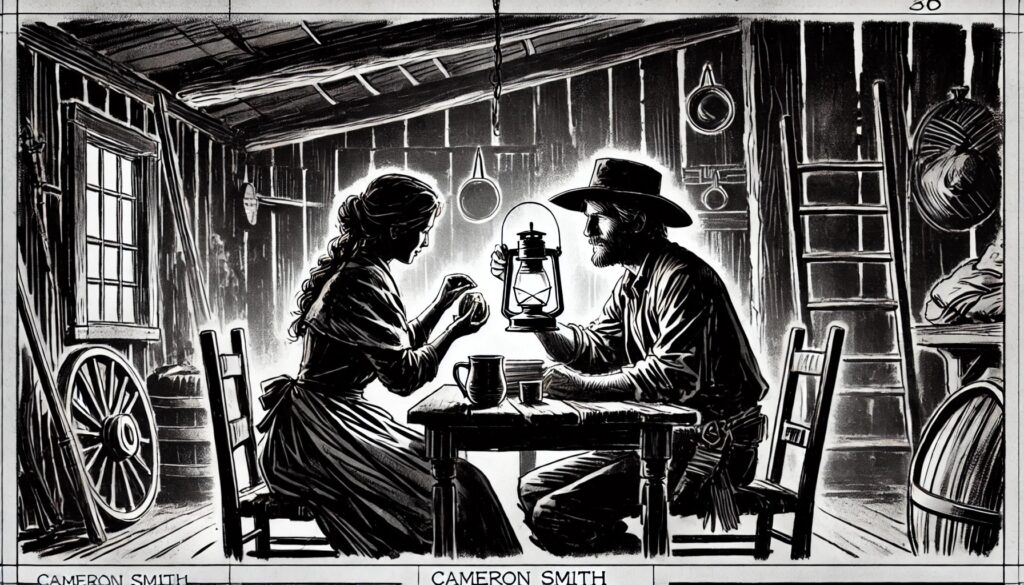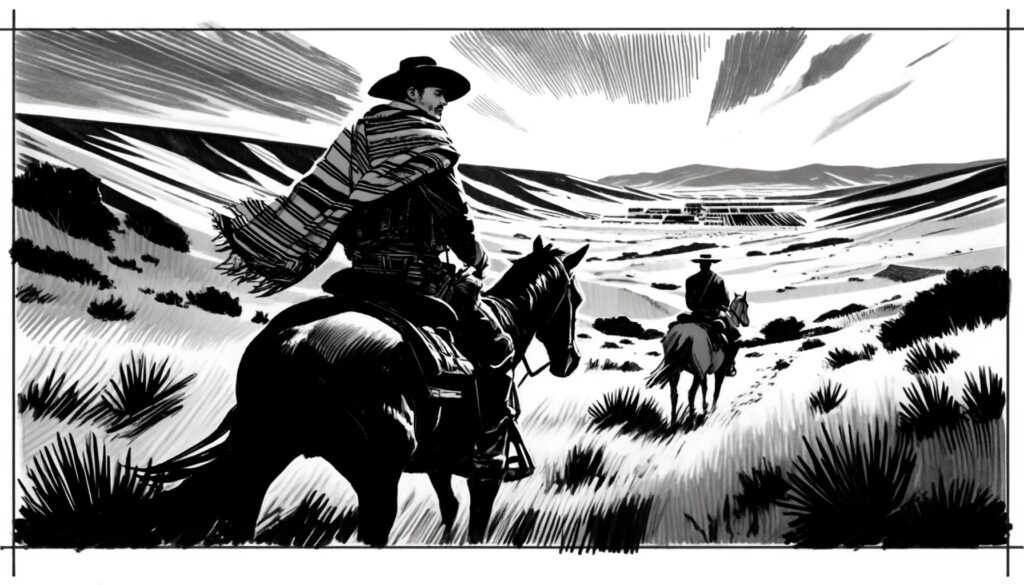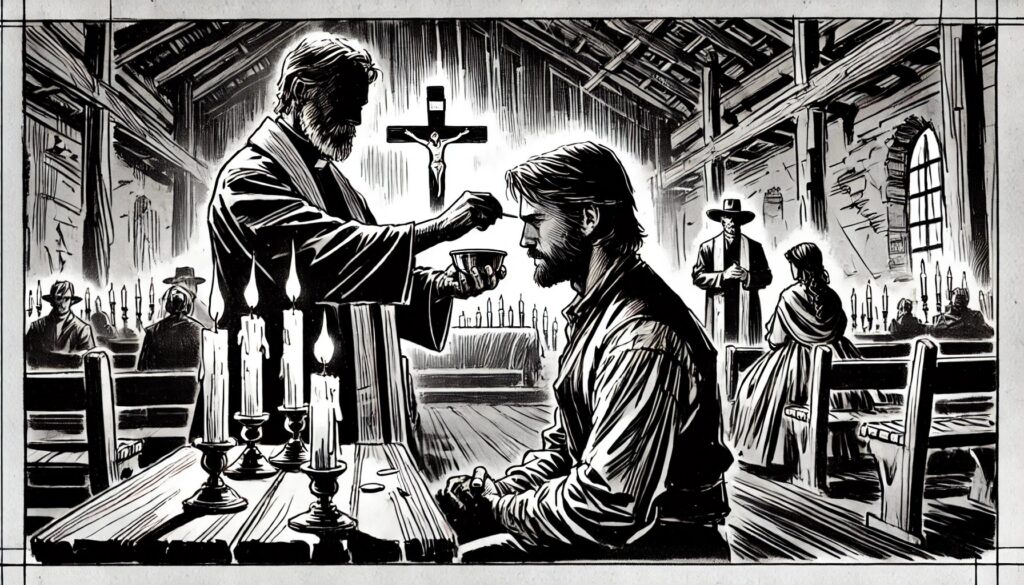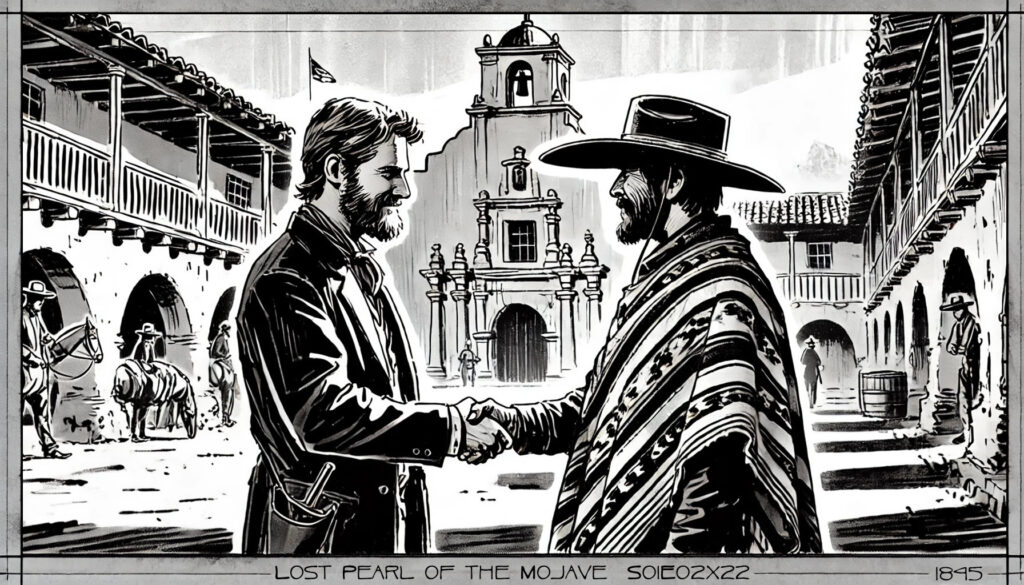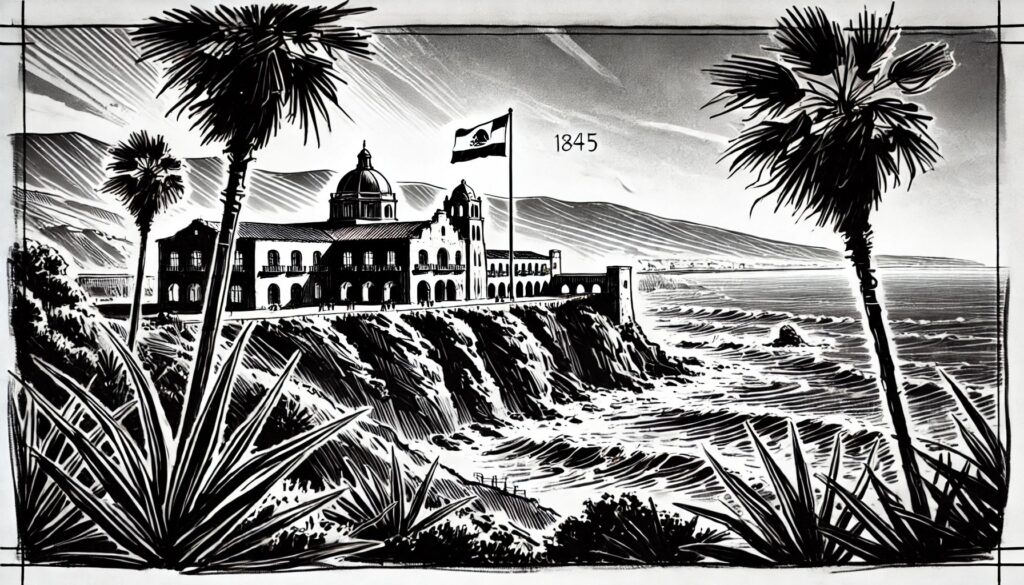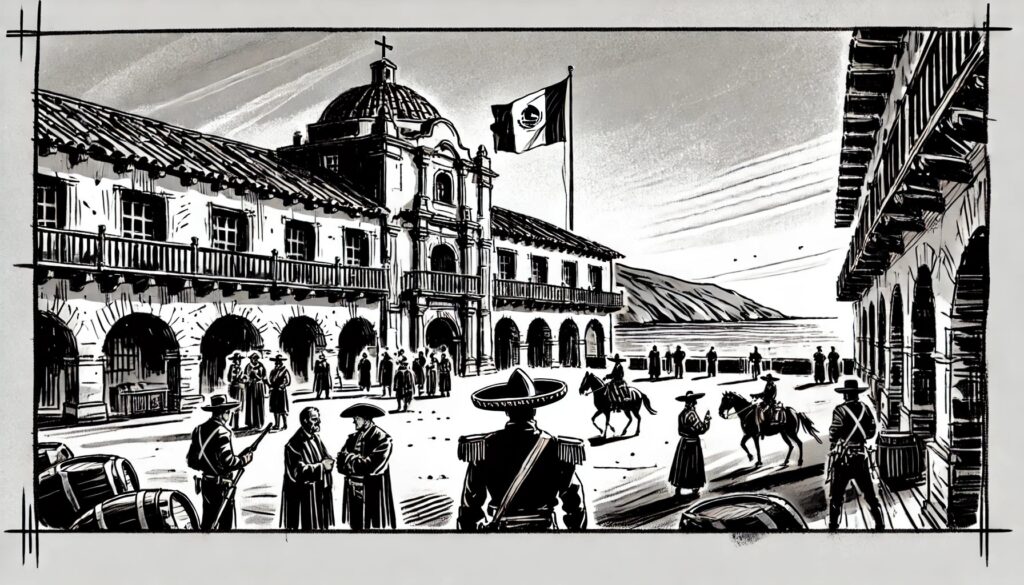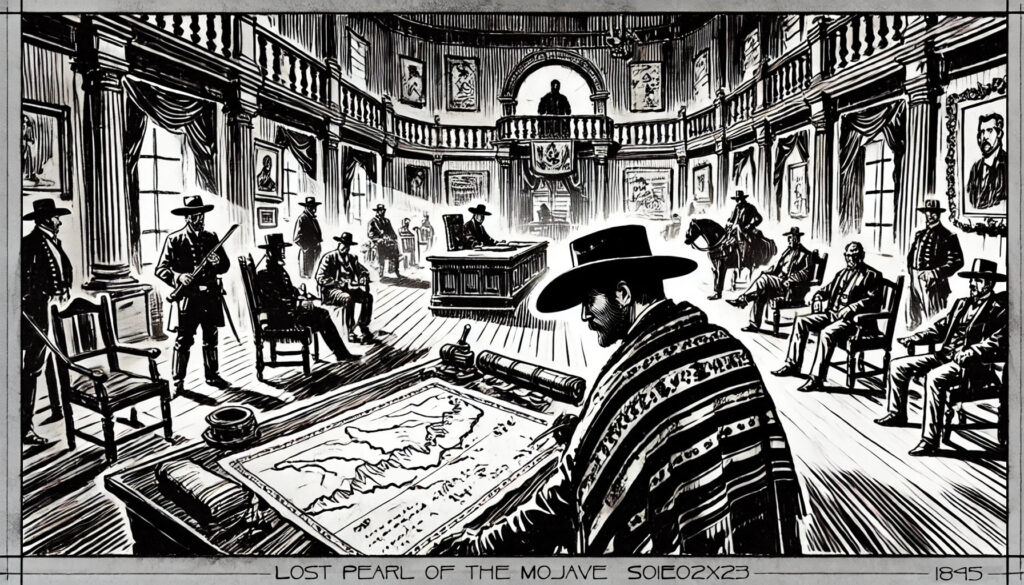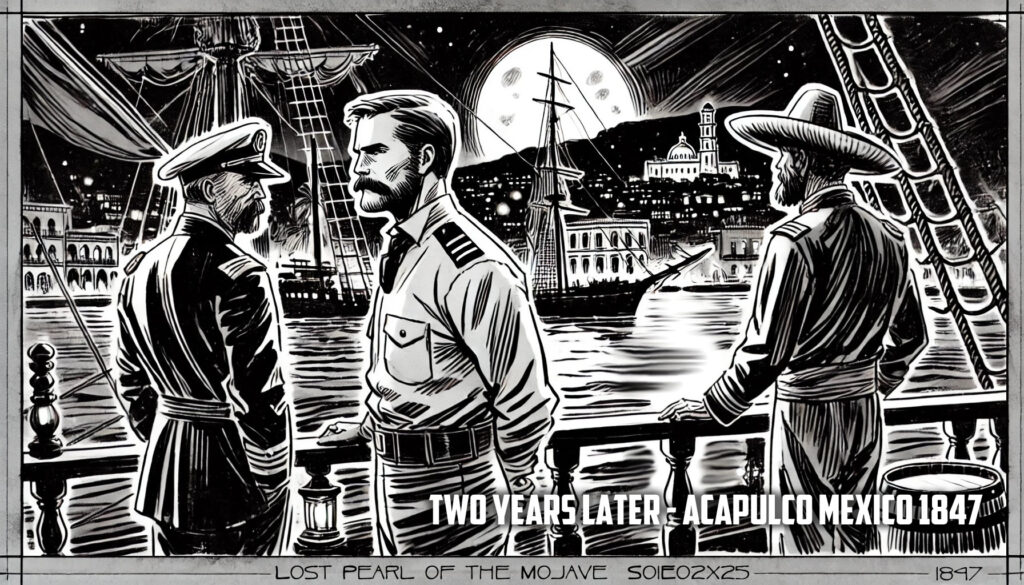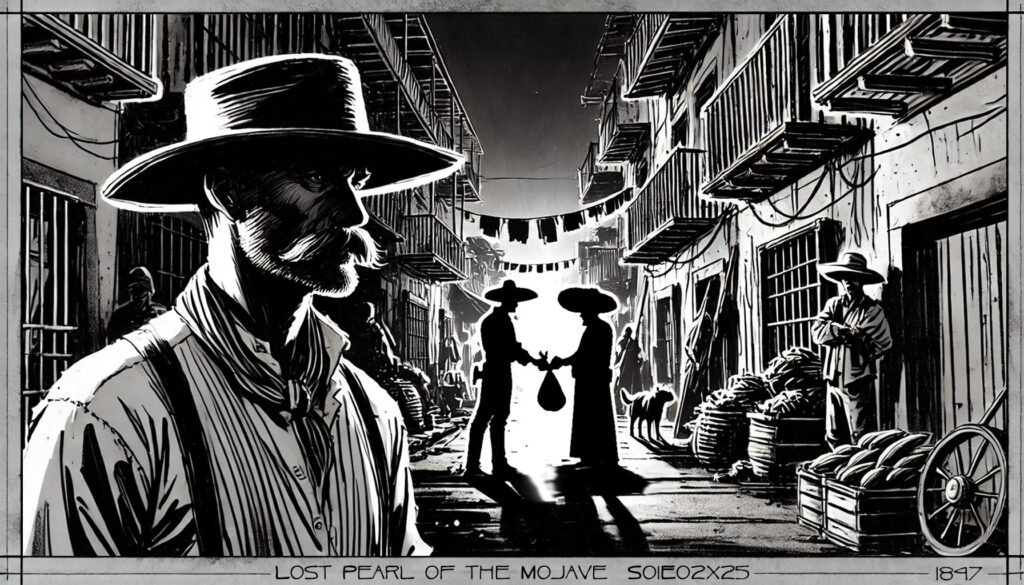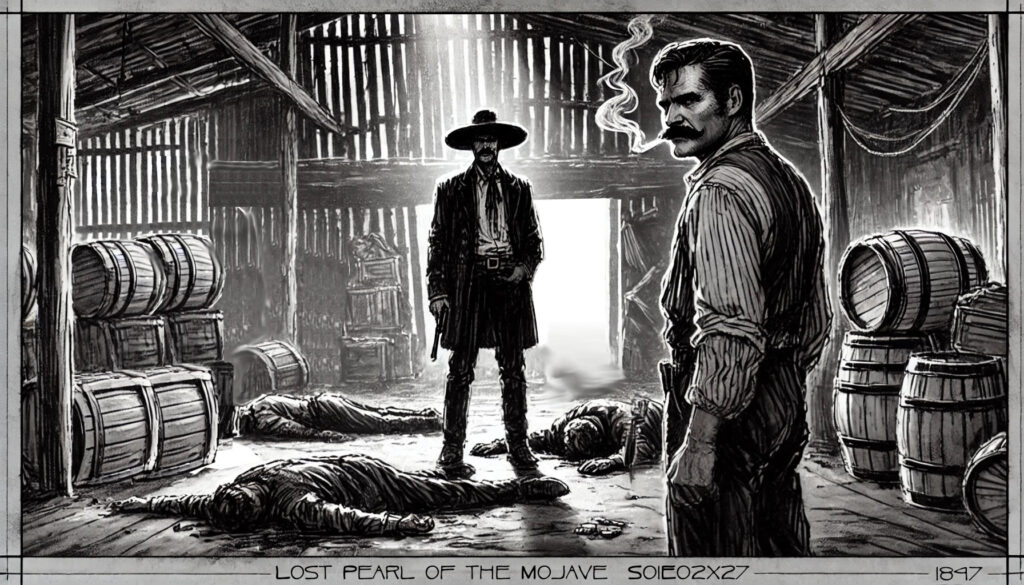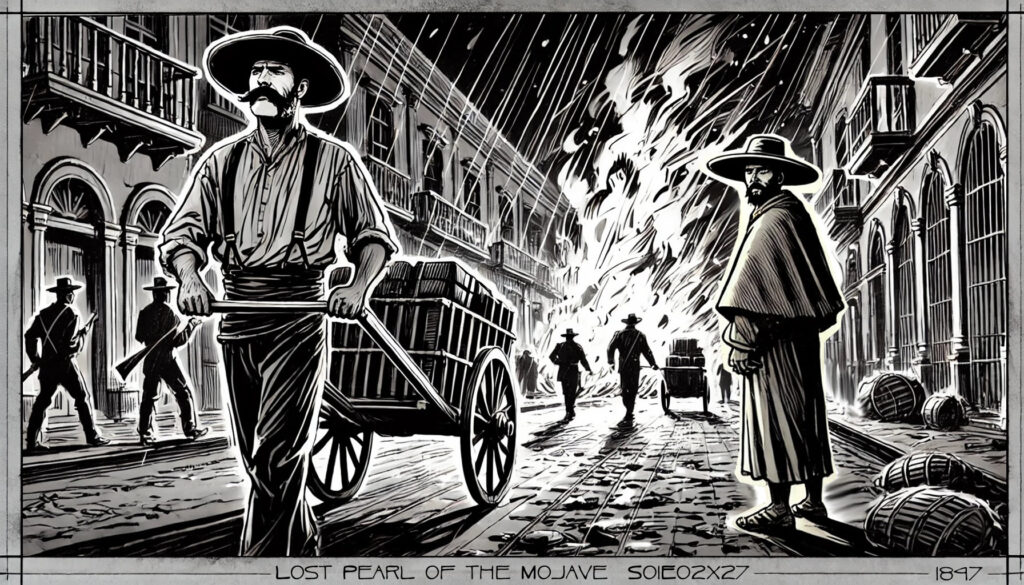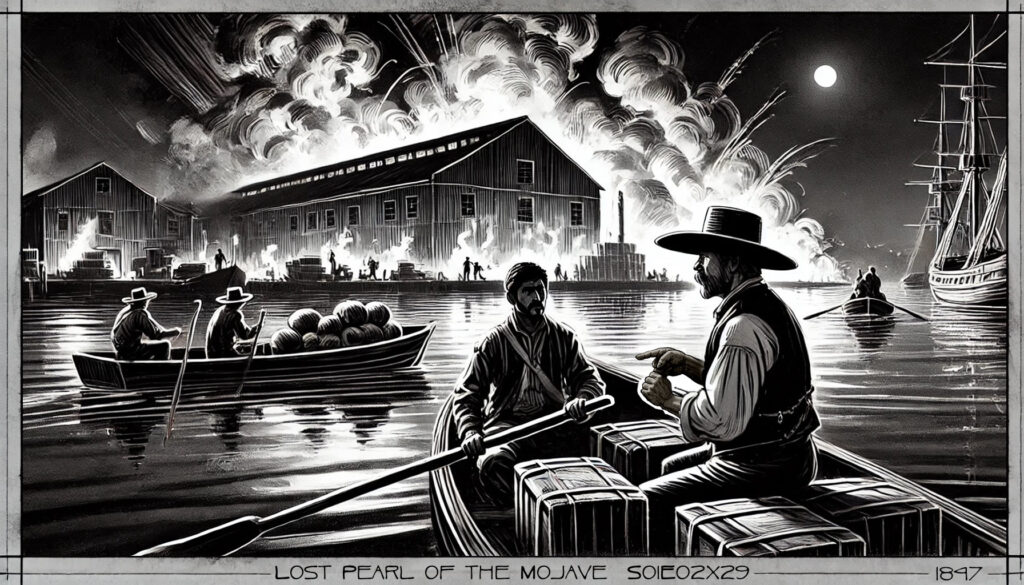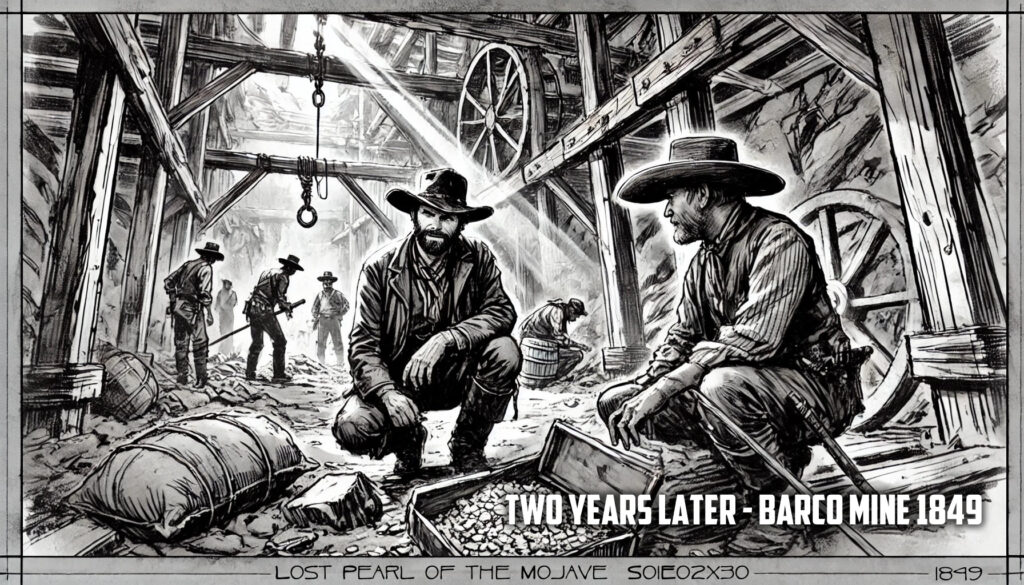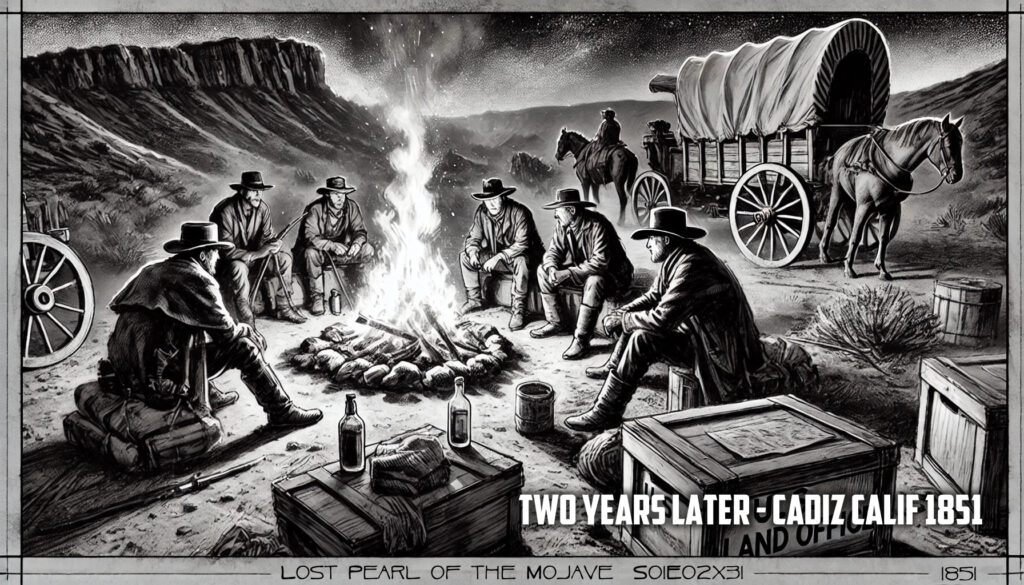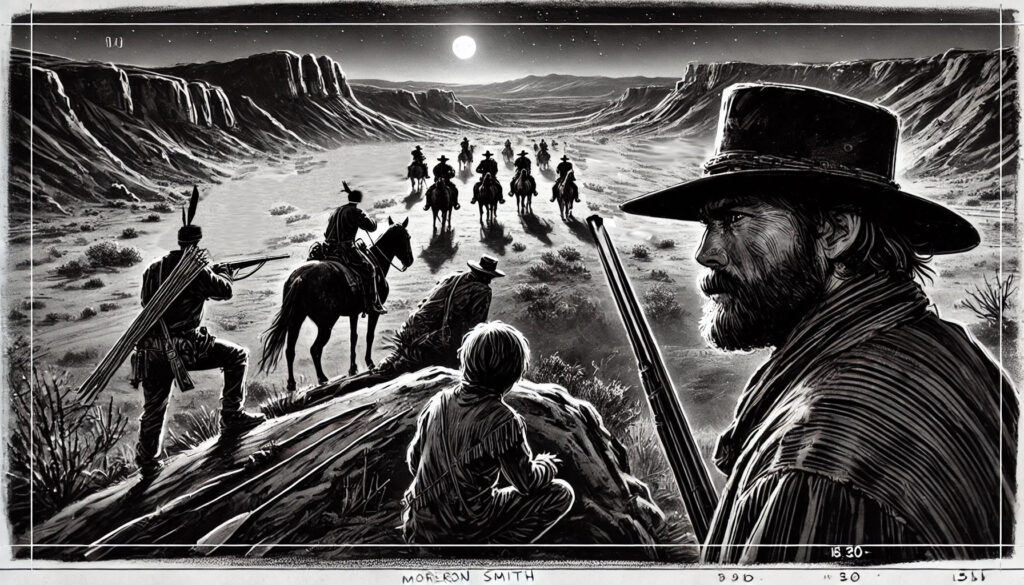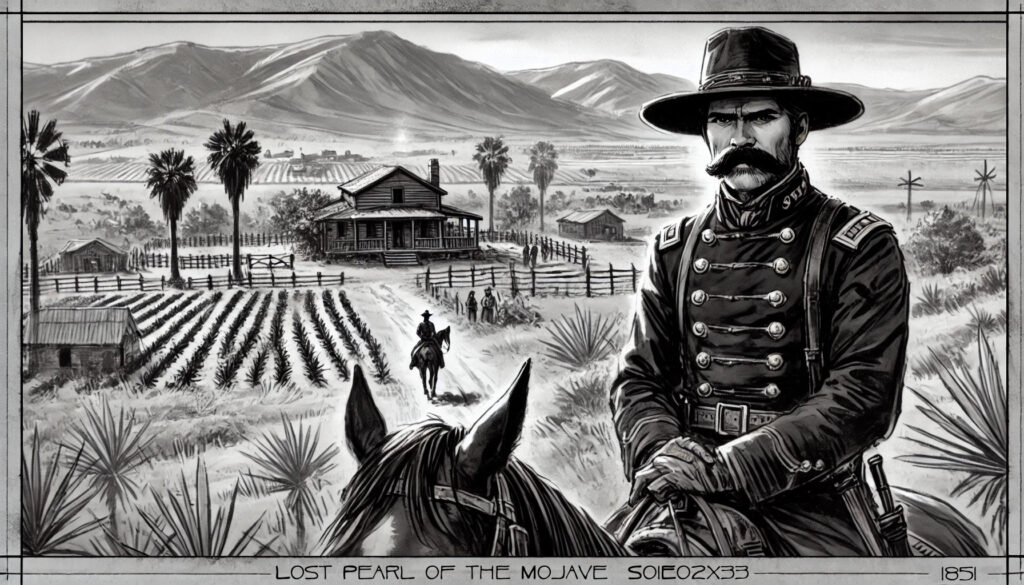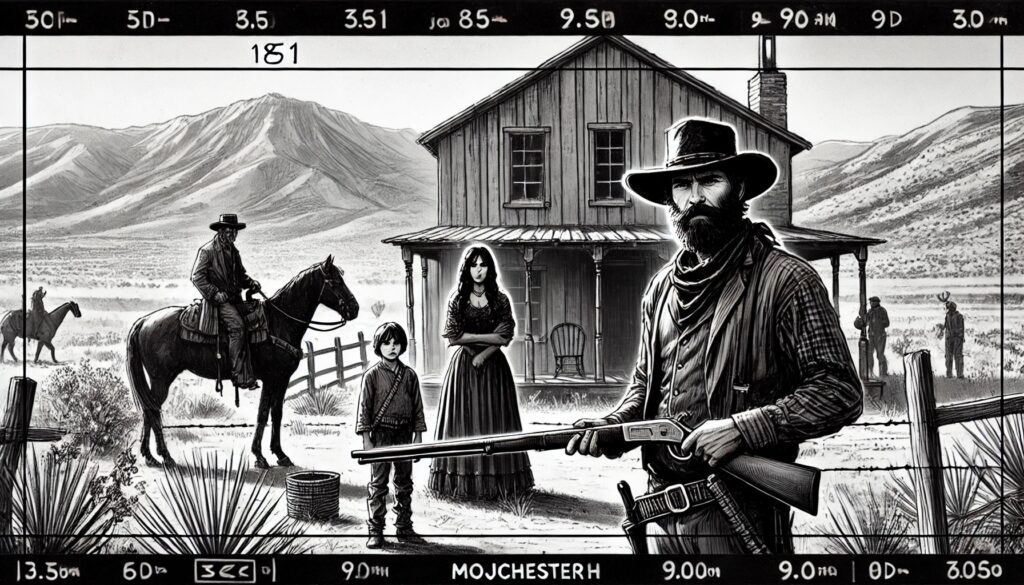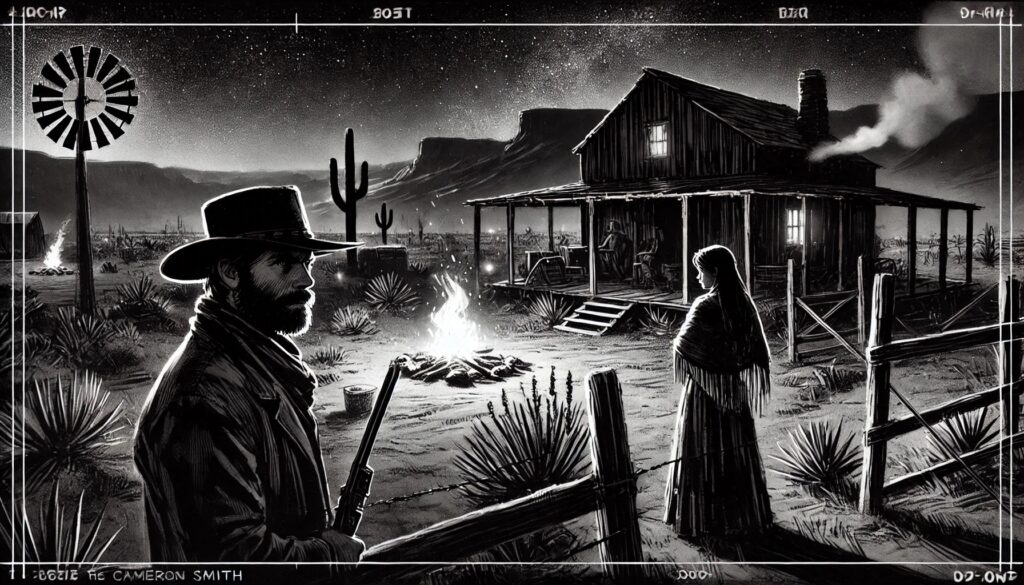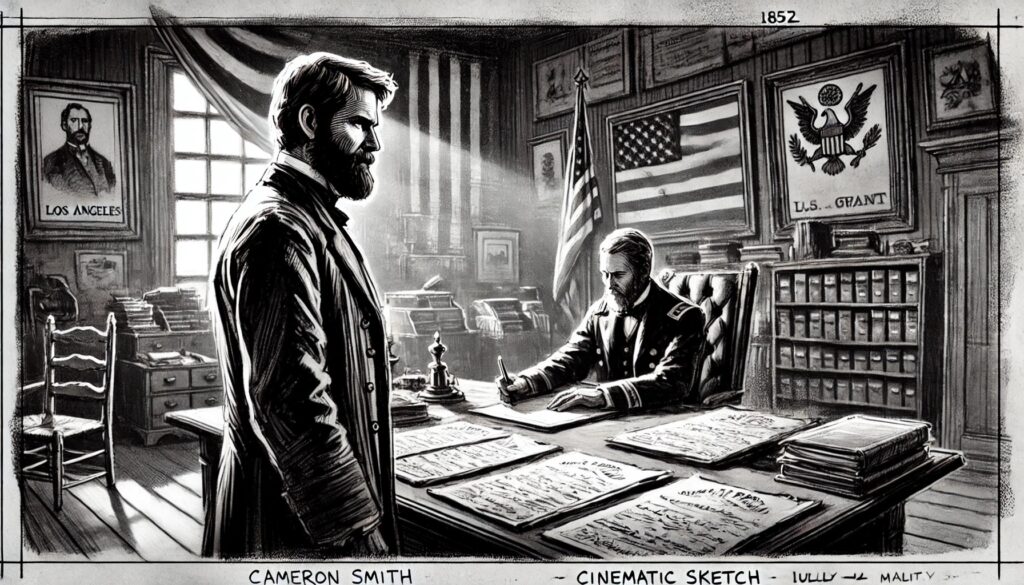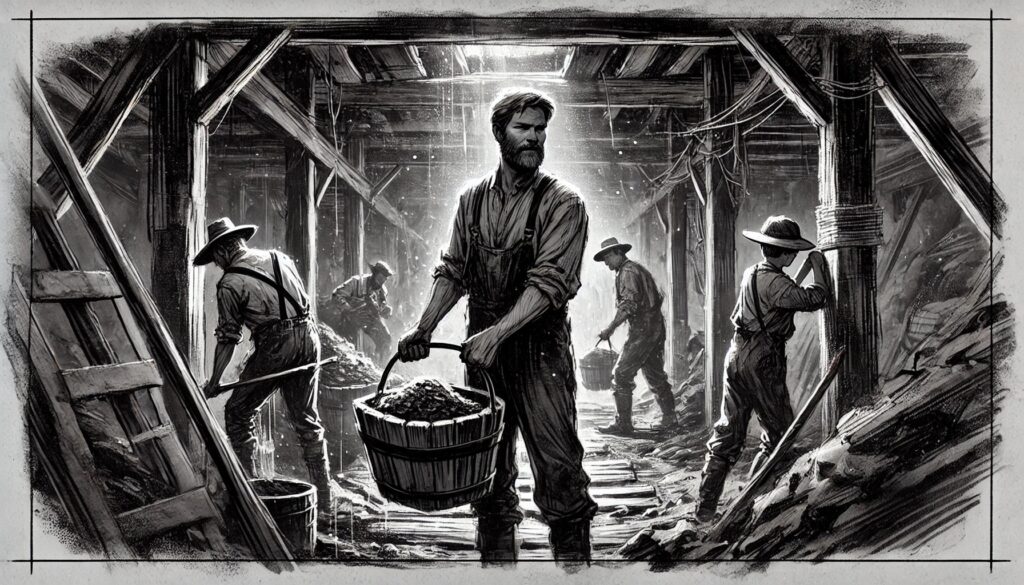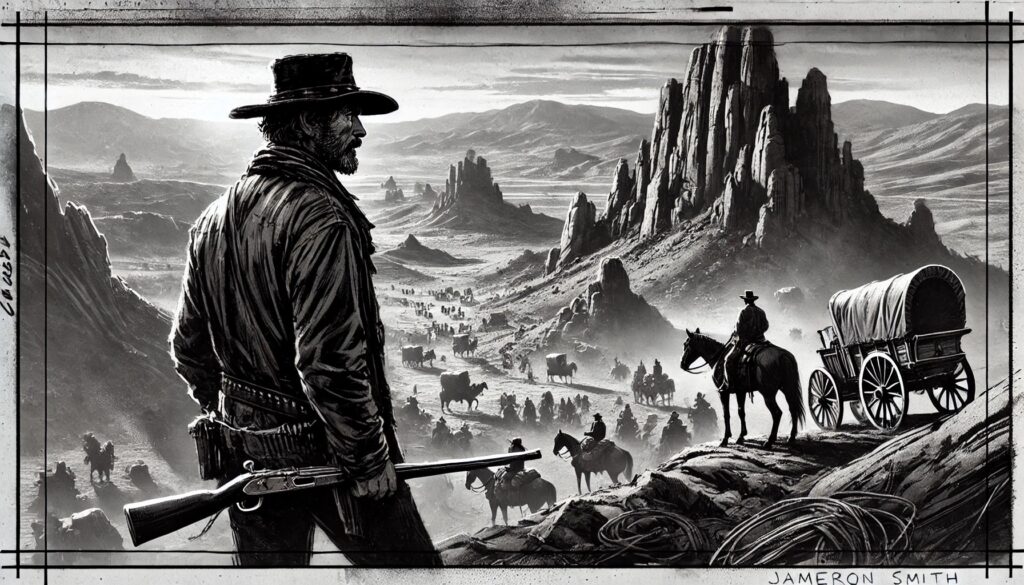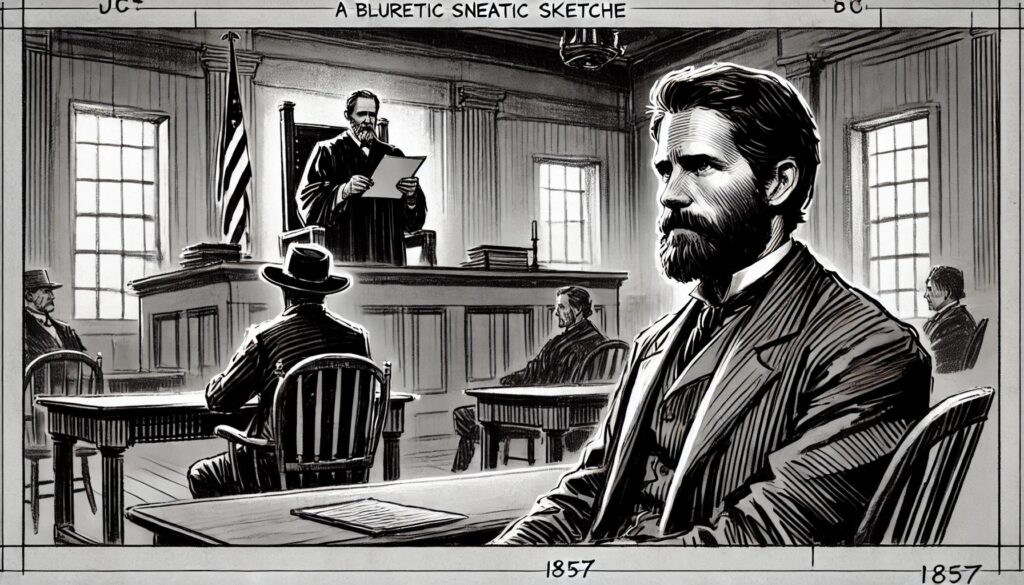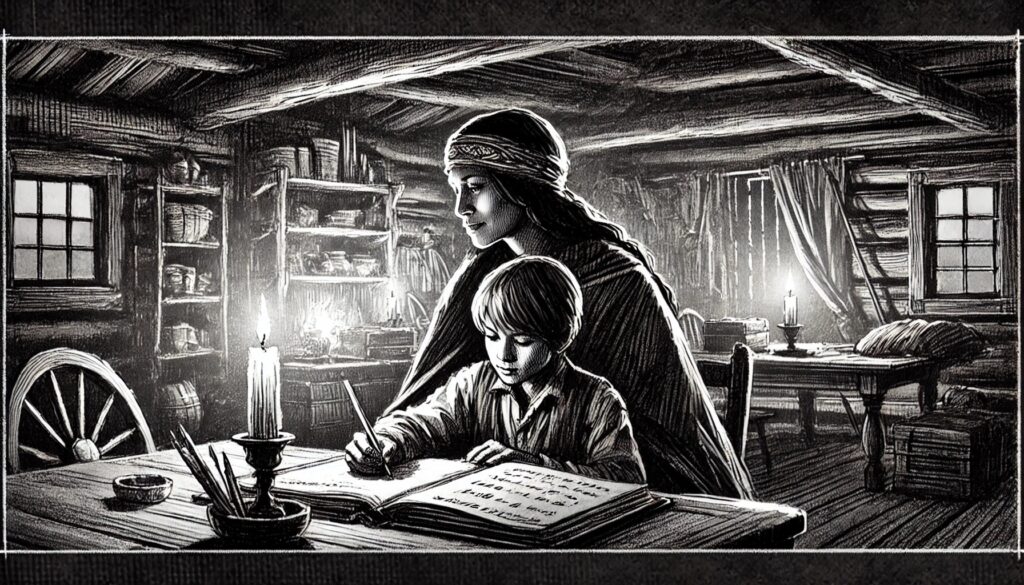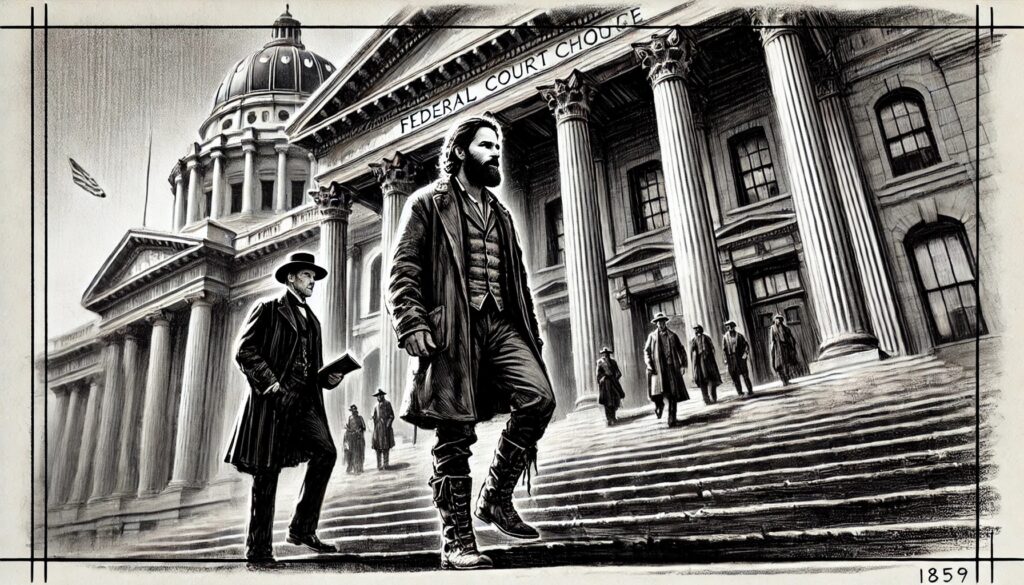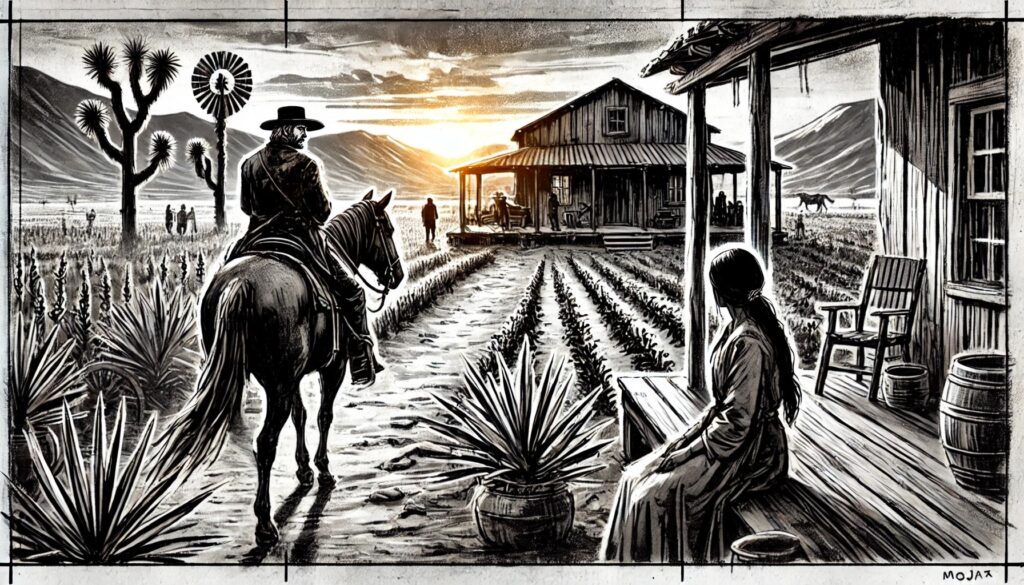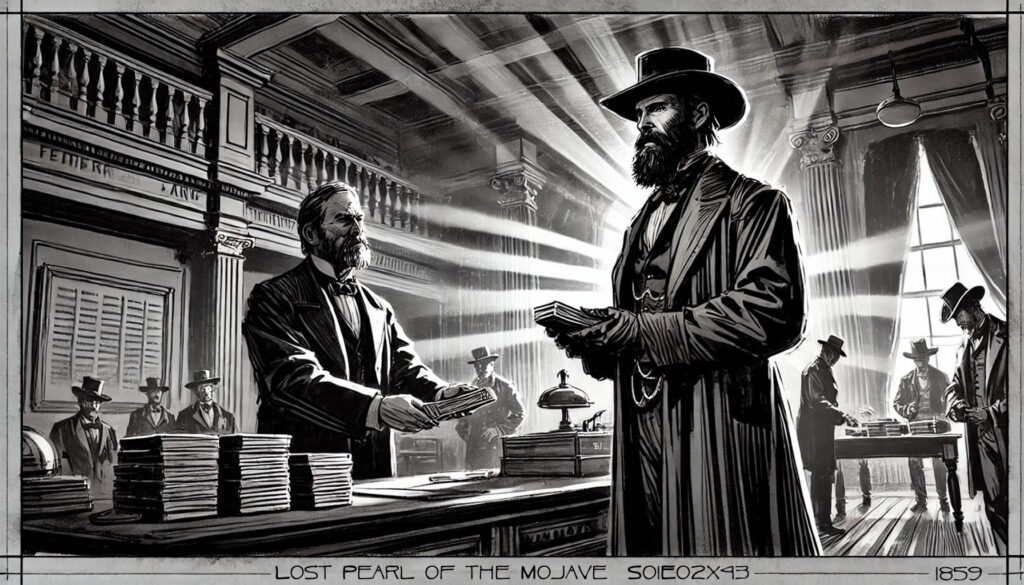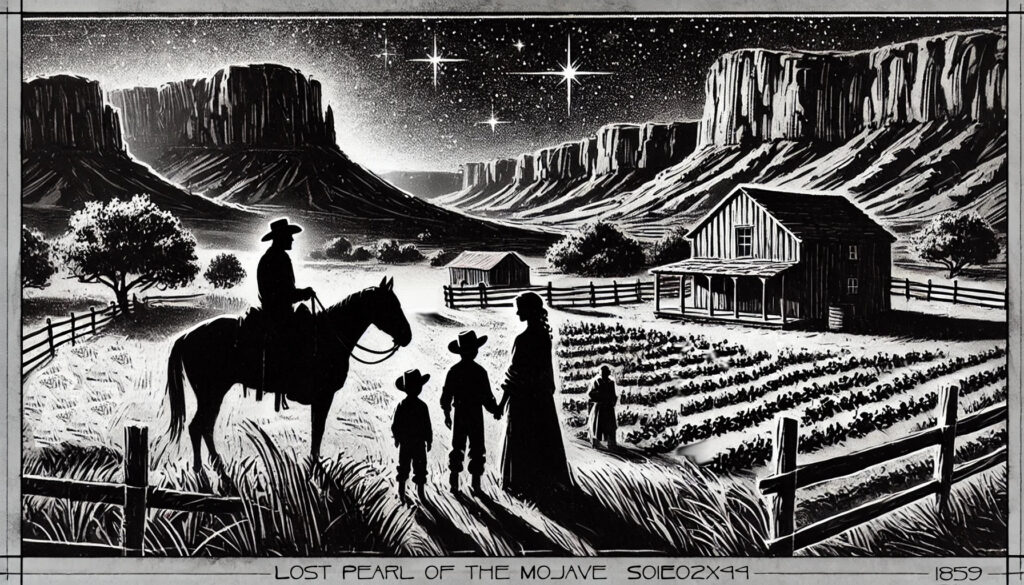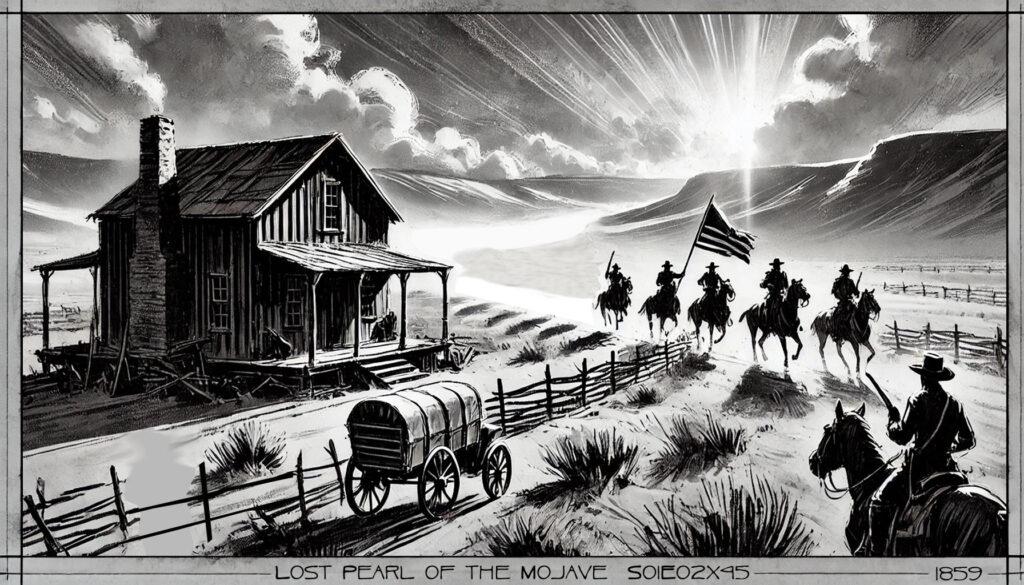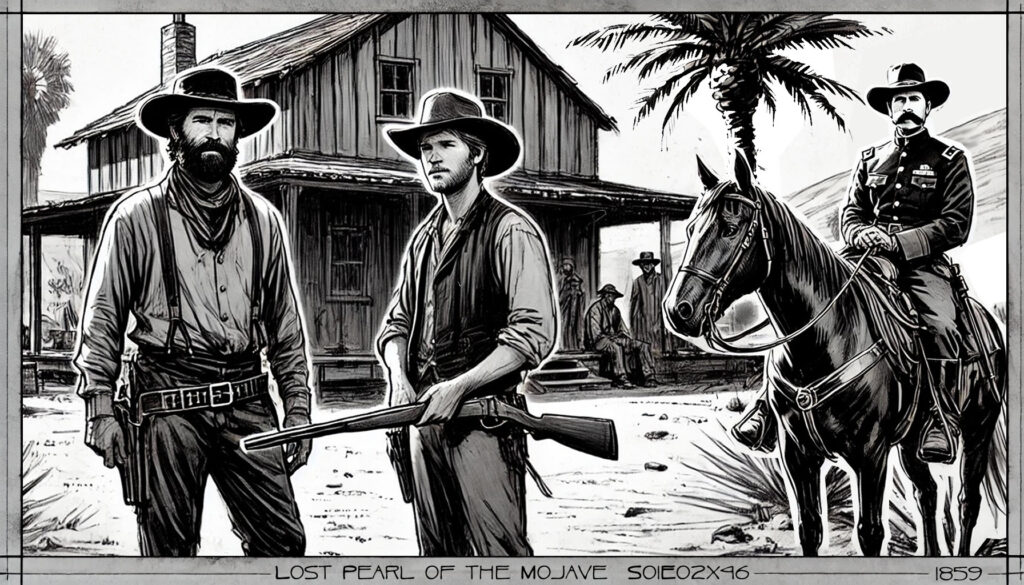The Lost Pearl of the Mojave – Episode 2
Claiming a Kingdom 1842-1860
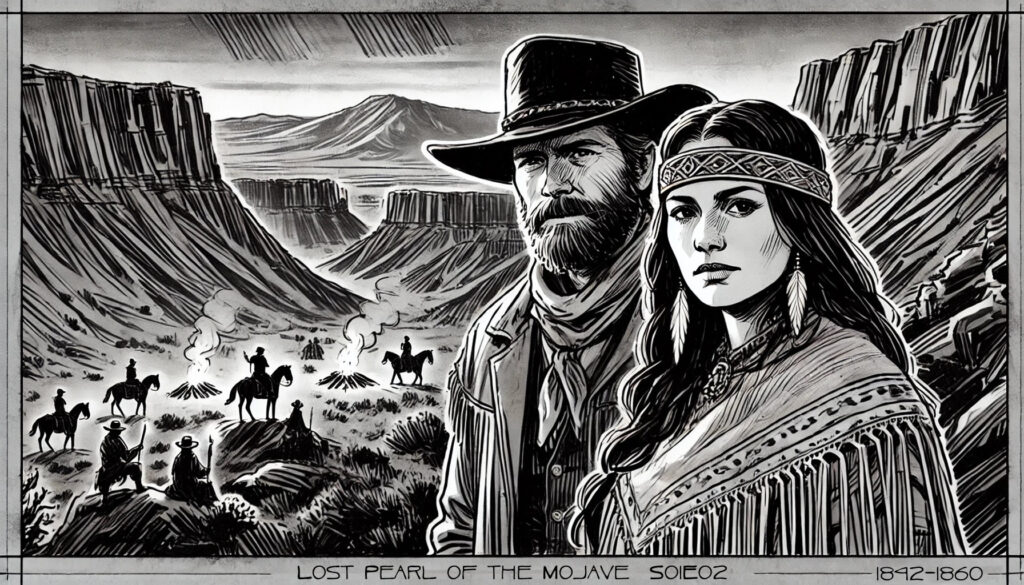
EXT. MOJAVE DESERT – SUNSET (1845)
SCREEN OVERLAY: “Mojave Desert, Alta California 1845”
The sun bleeds across the horizon, casting long golden streaks over the barren landscape. The desert awakens—not in stillness, but in movement. A HAWK soars overhead, its wings outstretched, catching the first heat rising from the earth. It gives a piercing screech, a hunter surveying its kingdom. Below, nestled in the shadows of scattered boulders, a RATTLESNAKE coils—silent, waiting. Its tail shudders once, a whisper of warning in the still morning air. The land is both beautiful and merciless.
In the distance, a rocky bluff rises from the sands, jagged and ancient, standing defiant against the sky. It looms over the desert like an unspoken challenge, a place where time has carved its story into stone.
MALIKA (V.O.)
The desert’s fate would now be shaped by those who dared to claim it.
The wind stirs, lifting dust in twisting spirals, as if the land itself is restless. The world is changing.
EXT. PROSPECTORS’ CAMP – CADIZ – NIGHT (1845)
The desert night is still. A crescent moon casts pale light over the makeshift camp—tents, wagons, and scattered supplies clustered in the dry basin. The prospectors, rough men from all corners of the frontier, sit around dying campfires, drinking, murmuring about gold veins and fortune. They don’t hear the warriors approach.
From the ridgeline above, Mojave braves crouch low, watching, waiting. Their painted faces blend with the rock and night, their movements silent as the wind through mesquite trees. The Chief’s eldest son signals with his hand. A sharp nod.
EXT. PROSPECTORS’ CAMP – MOMENTS LATER (1845)
Chaos erupts. A piercing war cry shatters the night. Then another. From the shadows, arrows streak through the air, striking into wagons, tents, and barrels—not to kill, but to ignite terror. A fire catches. A supply wagon bursts into flames, sending horses into a wild panic, their frantic neighing cutting through the dark. Gunshots ring out. The prospectors scramble for their rifles, overturning stools and whiskey bottles. But there is no one to shoot at—only shadows, movement, and fire.
PROSPECTOR
(panicked) It’s the damn Indians!
A second wave of attack. The Mojave warriors slash tent ropes, sending canvas collapsing onto men as they thrash and shout. Mules break free, galloping into the desert. A knife slashes a water barrel. Precious water spills into the sand, dark and wasted. Then—just as quickly as they came, the warriors vanish. The prospectors are left gasping, reeling. Their fires smolder, their supplies scattered. One man clutches his rifle, hands trembling.
PROSPECTOR LEADER
(gritted teeth) We can’t stay here. We’re too exposed. That was only a warning but they’ll be back.
EXT. SHIP MOUNTAINS – OASIS – DAY (1842)
SCREEN OVERLAY: “3 Years Earlier 1842”
The desert sun burns high, pouring golden light over a hidden paradise. Amidst the endless dust and rock, the oasis glows with life—water shimmering beneath the shade of tall, swaying palms. A gentle breeze rustles through broad leaves, carrying the scent of damp earth and ripe fruit. The sound of trickling water mingles with the distant hum of insects, a stark contrast to the silence of the surrounding desert.
Nearby, a modest homestead stands against the rugged landscape—a small but sturdy structure, built from timber and adobe, its walls sun-bleached, its roof thatched with palm fronds. A testament to perseverance.
CAMERON SMITH works beneath the shade of a wooden trellis, sweat lining his brow as he inspects the crops—rows of corn, pumpkins, melons, and beans thriving in the soil they’ve coaxed to life. His hands are calloused but steady. Irrigation from the springs has brought the plateau to life.
ANGELA MALIKA SMITH moves gracefully between the plants, her skirt brushing the soil as she kneels to check the leaves. Her fingers press gently into the earth, feeling its moisture, knowing its language.
Their young SON, runs barefoot across the packed dirt, laughter ringing through the air. He clutches wooden toys carved by his father—small horses, a tiny boat. His world is one of adventure, free beneath the open sky.
MALIKA (V.O.)
In a land of sand and stone, they carved out a home.
Water glistens as Malika fills a clay jug from a hand-dug well, her gaze drifting toward Cameron. He looks up, catching her stare. For a moment, they exchange a quiet understanding—the kind only shared by those who have fought to keep something sacred.
MALIKA (V.O.)
In a world of greed and gold, they share a secret.
A shadow passes overhead. A hawk circles above, its sharp eyes scanning the desert beyond. Malika follows its path, her expression shifting—something unsettles her. A feeling. A whisper of something unseen. Cameron notices but says nothing. He wipes his hands on his shirt and steps toward her. Their life is quiet. But peace in the desert is never promised. Their son laughs, unaware of the world beyond the oasis. For now, he is safe.
EXT. SHIP MOUNTAINS – CAVES – NIGHT (1844)
The moon hangs low over the jagged peaks of the Ship Mountains, its silver light barely touching the ground. Deep in the rocky shadows of the caves, a faint flicker of torchlight dances against the stone, swallowed by the vast, unyielding desert.
Inside the mine, damp air clings to the rough, uneven walls. Shadows stretch and twist as Cameron chisels away at a vein of gold, the sound of metal against rock echoing through the cavern like a secret whispered in the dark.
Sweat beads on his brow, trickling down his dust-streaked face. His movements are measured, deliberate—every strike of the chisel, every shift of stone must be controlled. This place must remain hidden.
The torch flickers. A gust of wind sneaks through the mine’s narrow passage, curling around him like a warning. Outside, the desert is silent, watching.
MALIKA (V.O.)
To survive the desert, you must know its ways.
Cameron brushes away loose rock, revealing something beneath—a deep seam of gold. It glows in the wavering firelight, rich and heavy, a temptation older than the men who crave it.
His hands tighten. For a moment, he just stares. Not at the gold, but at the weight of what it means. Wealth. Power. Risk.
MALIKA (V.O.)
To survive men, you must know their hunger.
Cameron exhales sharply. He chisels carefully, breaking free small chunks—just enough. He gathers the gold dust, sifting it into small satchels, to be hidden beneath worn supplies—wrapped in cloth, tucked between provisions, disguised among things no one would suspect.
A sound outside. Faint. A shift in the night. Cameron freezes, gripping the chisel. His heartbeat thuds against his ribs. The desert wind howls through the canyon, whispering through the crevices like unseen voices warning him to leave. He extinguishes the torch, plunging the mine into darkness. The desert keeps its secrets—for now.
EXT. TRADE ROUTE – DESERT CROSSING – DAY (1844)
The desert stretches wide and empty, but Cameron knows better—it is never truly empty. Heat ripples off the cracked earth as he rides alone, guiding a mule-drawn cart burdened with furs, grain, and carefully hidden gold.
The wheels groan against the dry ground. The sun burns overhead, relentless, turning the landscape into a shimmering mirage. He varies his route on every trip—a necessary precaution—as his trade leads him where Mexican traders, Mojave guides, and American merchants barter in dusty markets.
Cameron scans the horizon. The winds howl, stirring dust into spirals, but he keeps his focus ahead. Bandits. Bounty hunters. Opportunists. The trails belong to no man, and yet, they are never empty.
He adjusts the tarp over his cargo, ensuring the gold remains hidden beneath sacks of grain. A necessary precaution.
Along the way, he stops at Mojave and Chemehuevi encampments, trading knives, blankets, and flour for dried mesquite beans and fresh river fish. The people know him—his wife is a Mojave princess, and he is a man who trades fairly.
As the winds howl, he glances over his shoulder. The vast desert is never empty: bandits, bounty hunters, and opportunists lurk along the trails. He adjusts the tarp over his cargo, ensuring the gold remains hidden beneath sacks of grain. Then, with a flick of the reins, he presses forward—one step ahead of those who might be watching.
EXT. MOJAVE ENCAMPMENT – DAY (1844)
Smoke drifts lazily from cookfires as Cameron approaches a Mojave encampment nestled near a bend in the Colorado River. Children run barefoot, weaving between sun-bleached lodges. Women grind mesquite pods into flour, their laughter mixing with the wind. The people recognize him. A fair trader. An outsider, but not a stranger.
He halts the cart near the gathering circle. Malika’s father, the Chief, sits among the elders, his posture easy but his eyes sharp. He watches Cameron approach. Cameron bows his head respectfully, then lifts a bundle of fine knives and blankets from his cart. The Chief nods in approval, taking one of the knives, turning it in his hands.
CHIEF
Good steel. Fair trade.
Cameron smiles slightly, knowing the value of trust in these transactions.
CAMERON
Only the best for my family.
The Chief’s expression softens—Cameron is more than a trader. He is Malika’s husband, the father of his grandson.
CHIEF
And how is my grandson?
Cameron’s shoulders ease. The tension of the trail momentarily fades.
CAMERON
Strong. Quick-footed like his mother. Curious about the stars. He has seen four winters and four summers in our home.
The Chief chuckles. There is pride in his gaze, but also something else—a shadow of something unspoken.
CHIEF
You dwell in a sacred place. A man should see where his blood has taken root. I will come.
Cameron nods slowly, keeping his face steady. The words hang in the air, heavy with meaning. The Chief’s expression does not change, but his gaze lingers a little too long. Long enough for Cameron to feel the tightness in his chest. A gust of wind stirs the dust between them. Somewhere, a hawk screeches overhead. Cameron forces a small smile.
CAMERON
You will always be welcome.
The Chief nods, but does not smile. From the edge of the encampment, murmurs ripple through a group of younger warriors and the women. Cameron can feel their stares, the weight of their whispers. He doesn’t need to hear the words to know what lingers in their minds.
WARRIOR (O.S.)
Veta’ak is still missing.
Cameron doesn’t react. He keeps his face calm, his hands steady as he passes another bundle of trade goods to an elder. But inside, he feels it—the tightening in his chest, the chill beneath the desert heat. The Chief does not look at him directly. But there is a pause, a shift in the conversation.
CHIEF
The desert takes what it will. It always has. But the desert always gives up its secrets.
For a moment, silence. Then, the Chief lifts his chin slightly, signaling the trade is done. No more words about the missing warrior. No more words about what the desert buries. Cameron nods, but as he turns to his cart, he feels the eyes of the young warriors still on him. Watching. Wondering.
EXT. TRADE ROUTE – DUSK (1844)
Cameron rides west. The sky bleeds red as the sun dips below the jagged peaks. His furs and grain are lighter. His satchels of gold remain untouched. But behind him, in the whispers of the Mojave camp, he knows his shadow still lingers.
The desert keeps its secrets. For now.
EXT. BARCO PLATEAU – DAY (1844)
The sun casts long shadows over the plateau as CAMERON SMITH drives a post into the ground beside a half-built adobe structure. A modest house is taking shape—timber, hand-mixed clay, palm thatch for shade.
Beneath a nearby tree, a MEXICAN FAMILY rests—JUAN GARCÍA (40s), his wife ISABEL, and their two young children. Their belongings are few, but neatly arranged. A sense of hope lingers in the air. CAMERON walks over and hands JUAN a canteen, his sleeves rolled, face streaked with dust and sweat.
CAMERON
She’s not much yet, but she’ll keep the wind out. If you will work this homestead with me your family can live here with us.
JUAN rises, takes the canteen, and nods with quiet gratitude.
JUAN
I’ll work hard, señor.
That evening, the plateau is still. A warm wind moves through the palms as CAMERON stands with MALIKA near the edge of the oasis, looking toward the half-built home where JUAN and his family settle in for the night.
CAMERON
He’s good with a shovel. Quiet. The kind who’s seen hard times and doesn’t ask too many questions.
MALIKA watches the distant firelight flickering outside the new house. She doesn’t speak right away.
MALIKA
It is not just your secret, Cameron. It is ours. And once it is shared, it cannot be taken back.
CAMERON
I know. But I can’t do it alone anymore We need to extract the gold. I need someone here when I’m away to protect the plateau. Juan has a family to protect. That makes him careful.
MALIKA studies him—searching his face for doubt, hesitation, weakness. She finds none.
MALIKA
Then let him see it. And swear him by the fire, by the earth, by what feeds his children.
CAMERON nods, grave. This is no longer about labor—this is legacy.
EXT BARCO PLATEAU CAVE ENTRANCE (1844)
CAMERON leads JUAN down a narrow crevice hidden behind scrub and stone. Torchlight flickers along rough rock walls. They reach the opening—veins of gold glint in the torchlight, raw and untouched. JUAN takes a breath. It’s not wonder in his eyes—it’s understanding. He sees what’s at stake.
CAMERON
This stays between us. You speak of it to no one other than your wife, not the priest, no one.
JUAN
(quiet, steady) I understand.
CAMERON
If word gets out, this place will be swallowed whole. Your silence is our survival. Without it, we will both lose everything. We’ll all be run off or buried beneath it.
JUAN touches the wall with reverence—then pulls his hand away like it burned him.
JUAN
Then I will guard it like my own soul.
CAMERON nods. It’s not just a work agreement—it’s a covenant of survival. Later, the sun lowers as CAMERON and JUAN work side by side at the mine entrance, hauling out small satchels of ore. JUAN is methodical, silent, strong.
At the homestead, their children chase each other through rows of young crops, laughter echoing off the canyon walls. MALIKA watches from a distance, smiling faintly. ISABEL prepares food over a cookfire. She glances toward the mine, then back at the children, protective but at peace.
MALIKA (V.O.)
In the desert, a family is not only blood. It is built in trust, in toil, in silence kept when it matters most.
As twilight falls, CAMERON, JUAN, and their families gather near the fire. Plates pass between them. The children curl up on woven blankets beneath the stars. They are no longer just neighbors. They are something more.
INT. GOVERNOR PÍO PICO’S PALACE – MONTEREY – DAY (1844)
SCREEN OVERLAY: “Monterey Alta California 1844”
Sunlight pours through tall windows, casting geometric shadows across hand-carved furniture and dusty maps of Alta California. GOVERNOR PÍO DE JESÚS PICO, proud and sharp-eyed, stands before a long table strewn with land records, ink-stained maps, and folded letters. His SECRETARY, young and anxious, watches as Pico draws a red line across a parcel marked near the Colorado River.
SECRETARY
More petitions, Governor. Ranchers from Los Angeles… and a few foreign settlers.
PICO
(dryly) Foreigners have always wanted what is ours. Now they come with lawyers instead of lancers.
Pico walks to a window, looking out over the Monterey hills. A horseman rides by below.
PICO
The Americans are coming. Maybe not with armies yet, but with maps… and treaties.
SECRETARY
Then perhaps we should slow the approvals—hold land in reserve until Mexico strengthens its position.
PICO
No. The opposite. (turning sharply) We need to issue grants to every loyal Californio, every Mexican settler, every man willing to put up a fence and defend his claim for Mexico.
He picks up a quill and dips it in ink with deliberate precision.
PICO
If we do not mark this land as Mexican now, it will be swallowed whole by the next flag they raise.
SECRETARY
And the foreigners?
PICO
If they marry into our families, convert, live by our laws… maybe. But only if they swear loyalty.
Pico pauses, eyeing a sealed letter stamped with the crest of Sonora.
PICO
Bring me the next petition. We have land to protect.
EXT. CLIFFHANGER LOOKOUT – NIGHT (1845)
SCREEN OVERLAY: “One Year Later – 1845”
The wind howls through the jagged cliffs, carrying the distant crackle of campfires burning on the horizon. Smoke rises in thin, curling trails against the moonlit sky—prospectors. Cameron and Malika stand on the bluff directly above the caves, staring westward, their faces illuminated by the faint glow of their own fire below. The desert is vast, but tonight, it feels too small.
MALIKA
They are close.
CAMERON
Too damn close.
A long beat. Cameron clenches his jaw, his gaze fixed on the distant fires. This isn’t just a few drifters passing through. This is a camp—a foothold.
CAMERON
We are going to need help defending our home, or everything will be lost.
Malika studies him. There is no fear in her eyes, only certainty. She has known this day would come.
MALIKA
You have been good to me. Good to my people.
She takes his hand. A rare gesture, a promise in the dark.
MALIKA
Cameron, we are not alone.
EXT. CAMERON’S HOMESTEAD – MOMENTS LATER (1845)
The sound of pounding footsteps. A young MOJAVE SCOUT sprints into the homestead, breath ragged, dust rising in his wake.
SCOUT
Riders. Armed. They search the land.
Cameron exhales sharply. He exchanges a look with Malika—this is it.
MALIKA
Go to my father. Tell him to come. We need his help.
The scout nods, turning swiftly before disappearing into the night. Cameron looks at Malika with concern. They acknowledge their secret as their eyes drift to the resting place of the Mojave Warrior.
EXT. SHIP MOUNTAINS – OASIS – NIGHT (1845)
A fire burns low, embers rising into the cold desert night. A circle of Mojave warriors sit silently, their faces half-lit by the flickering flames, half-lost in shadow. The CHIEF watches Cameron. His expression is unreadable. The weight of many generations, many battles, many losses rests in his gaze. The wind shifts. It carries whispers through the trees—whispers of the land, the water, the men who seek to claim both.
CHIEF
The land speaks—it warns of a storm of men who follow the rivers, searching for gold.
Cameron glances at the oasis. The palm trees sway under the moonlight, their rustling leaves like hushed voices. This place is alive, hidden, sacred. But for how much longer?
CHIEF
For generations, our fathers have guarded this secret. The water is sacred. The water is life.
The Chief’s gaze sharpens. His voice is measured but heavy with something unspoken.
CHIEF
Until now, no outsider was ever allowed here.
The warriors shift slightly. Some exchange glances. A few tense hands rest on knives. The fire crackles, filling the silence between words.
CHIEF
You have been good to my daughter. You have brought this land to life.
A long pause. Then, the Chief leans in, locking eyes with Cameron.
CHIEF
But one of our own is gone.
The circle tightens. The warriors remain still, but the air changes. The missing Brave— his absence weighs upon this meeting like a specter. Cameron does not flinch. He knows this moment will decide everything. Judgment or absolution.
CAMERON
(steady, measured) If someone was taken from this place, then it would not have been by my will.
A few warriors shift. A breeze stirs the embers, sending a thin stream of smoke curling into the night air. Cameron keeps his voice even, his hands still.
CAMERON
(firm) I would never dishonor this land or your people. I would defend this place and my family, and if attacked, I would defend myself.
The Chief watches him. His gaze is unwavering, unreadable. The silence stretches. The wind whispers through the canyon. The Chief looks towards the hill where Veta’ak is burried.
CHIEF
(measured, cold) If we help defend this place, blood will be spilled.
His meaning is clear. Will it be the blood of their enemies… or Cameron’s? The Chief exhales slowly. His gaze sweeps over the warriors, the fire, the land. He lets the silence hold, lets the night itself decide. Then, he speaks—not just to Cameron, but to all who are gathered.
CHIEF
(solemn, unshakable) No more blood will be spilled in this sacred place. We will join you and we will take the storm to the outsiders.
His words settle like stone. An acknowledgment. A command. A final word on the missing warrior. The warriors absorb the meaning. Some shift, some nod, others keep their silence. The decision is made. Cameron dips his head slightly—not victory, but acceptance.
CAMERON
(steady, unshaken) The land sings with your ancestors’ voices. But the men who come—Mexicans, Americans—they take what they want with armies and guns and assign the land with paper and ink. That is a battle we cannot win by force alone.
CHIEF
(frowning, absorbing the words) Then how will we combat their ink?
CAMERON
(with quiet determination) I will prepare documents in their language, I will persuade them to recognize what has always been ours. Our legacy must be forged in the fury of our defenses—and validated in the language of their laws.
CHIEF
(measured, solemn) Our blood is in this land. If we stand, we stand together.
Cameron steps forward. He meets the Chief’s gaze, understanding the weight of these words.
CAMERON
Then we fight as one.
The Chief extends his hand. Not a gesture freely given, but one earned. Cameron clasps his forearm, gripping tightly. A warrior’s clasp. A silent vow. Around them, the Mojave braves nod in quiet approval. The pact is made.
CAMERON
(firmly) For my family. For your people. For the land that sustains us. We will stand united and face the storm.
The fire crackles. The wind carries whispers through the canyon. The war for this land is only beginning.
EXT. RIDGELINE ABOVE CADIZ – NIGHT (1845)
The desert breathes in silence. Below, a white man’s camp smolders with carelessness—tents pitched without thought, fires left to die, horses tethered too close to wagons. They do not see. They do not listen.
On the high ridge, Mojave braves wait. Their bodies still, faces painted in black, ochre, and bone, they become part of the stone. Part of the night. Only the eyes move—watching, calculating.
The Chief’s eldest son lifts two fingers. A pause. Then, a flat palm—the signal is given.
EXT. PROSPECTORS’ CAMP – MOMENTS LATER (1845)
The first war cry rips through the dark. A second follows, like the echo of the land itself remembering its wounds.
From every side, the Mojave descend like shadow and flame. Arrows whistle through the air, aimed not to kill—but to scare, to scatter. A warning wrapped in wind.
A torch hits dry canvas. Flames leap upward. A wagon erupts—fire and chaos spilling into the camp like punishment.
Horses rear. Men shout. Gunshots bark at nothing. The prospectors fire blindly into the night, chasing ghosts they cannot catch.
The warriors strike fast and vanish faster. A tent collapses with a single slice. A water barrel is split open—the sacred liquid lost to the dirt, just as their respect was.
A knife cuts the reins of mules. They scatter into the dark, carrying fear in their hooves.
One warrior grabs a satchel—maps, bullets, gold pans. He hurls it into the fire. This land was not meant for greed.
Then—silence. The Mojave vanish into the rocks. Gone like smoke.
EXT. DESERT RIDGE – CONTINUOUS (1845)
The warriors regroup, crouched in the dark above. Below, the white men scramble—grabbing rifles, stumbling over tents, cursing the night.
The Chief’s son watches with steady eyes. He does not speak. He does not smile. This is not vengeance. This is balance.
EXT. PROSPECTORS’ CAMP – DAWN (1845)
The camp is broken. Wagons charred, tents shredded, barrels empty. The men are quiet now, hunched and small in the rising light.
PROSPECTOR LEADER
(gritted teeth) We can’t stay here. We’re too exposed. That was a warning… but they’ll be back.
He’s right. By the time the sun crests the mountains, the camp is abandoned. They leave behind ash, twisted metal, and broken dreams.
EXT. RIDGELINE ABOVE CADIZ – DAWN (1845)
The warriors watch from the high ground. The desert wind carries the last echo of fleeing hooves and wagon wheels. Their land is safe—for now. The Chief exhales, satisfied. No unnecessary bloodshed. No dead men to stir up an army. Only fear. And fear is enough.
CHIEF
(quiet, to his braves) They will not return. But others will come.
The warriors nod. They slip away into the desert, ghosts in the rising sun.
EXT. BARCO PLATEAU – DAWN (1845)
The morning mist clings to the hills as CAMERON stands alone on a rise, gazing over the oasis and his growing homestead. He holds a folded piece of parchment—his drafted petition for land. JUAN approaches, carrying a bundle of fresh mesquite wood. He pauses beside Cameron, following his gaze.
JUAN
When you ask Mexico for the land… you must name it.
CAMERON
I’ve been thinking about that.
JUAN
How about Rancho El Barco Perdido?
CAMERON
Barco? What is Barco?
JUAN
In Espanol, it means “The Ship.”
CAMERON
(softly, surprised) Barco…
Cameron turns the word over in his mouth. His eyes flash with quiet meaning—the ship in the desert, the one he chased, the one he found in another form.
CAMERON
If I’m going to do this, I really need to learn Spanish.
JUAN
If you want this land, you need to become Spanish. You must speak the language. Live the faith. (beat). Isabel will teach you her family is Castilian—old Spain. They understand what it means to protect land through loyalty.
MONTAGE – CAMERON’S PREPARATIONS (1845)
ISABEL teaches Cameron Spanish around the fire, holding up objects—“agua,” “caballo,” “tierra.” He repeats the words with care, writing them in a small notebook.
JUAN and CAMERON ride across the dry hills toward a distant mission town. Cameron now wears a wide-brimmed hat, serape, and a leather vest—formal clothing of a ranchero.
Inside a humble church, lit by candles, CAMERON kneels. A PRIEST anoints him with holy water. JUAN and ISABEL stand behind him, solemn witnesses. Cameron crosses himself, still unsure of the gesture but firm in intent.
EXT. MISSION COURTYARD – LATER (1845)
The three emerge into the sunlit courtyard. A breeze lifts the edges of Cameron’s new vest. He walks differently now—shoulders squared, bearing rooted in something deeper.
JUAN
Señor Herrera.
CAMERON
Who’s that?
JUAN
You, Mister Smith. “Herrera”—it is “Smith” in Spanish.
CAMERON chuckles, adjusting his hat. The name fits strangely on his shoulders—but he wears it anyway.
EXT. GOVERNOR’S PALACE – MONTEREY – DAY (1845)
SCREEN OVERLAY: “Governor’s Palace Monterey Alta California 1845”
The Governor’s Palace stands on a coastal bluff, overlooking the blue expanse of Monterey Bay. The Spanish-style adobe building, with its arched corridors and tiled roof, is the political heart of Alta California.
A Mexican flag flutters in the ocean breeze as soldiers in charro-style uniforms patrol the courtyard. Merchants, landowners, and officers come and go, their voices blending with the distant crash of waves.
INT. GOVERNOR’S PALACE – MONTEREY – DAY
Inside, GOVERNOR PÍO DE JESÚS PICO holds court—his word shaping the fate of men and land alike. The room is lined with maps and land grants, the air thick with the scent of ink, sweat, and ambition.
Cameron, dressed in Mexican attire, approaches the governor’s ornate desk. He lays out a diseño map, the inked lines marking a stretch of rugged, barren land deep in the Mojave Desert.
CAMERON
(measured, respectful, in Spanish) The land is remote. Harsh. But my wife’s people live there. I wish to establish Rancho El Barco Perdido in the Mojave. It’s along a trade route where I believe I can establish a valuable outpost.
GOVERNOR PICO
(glances at the map, unimpressed) The Mojave? ¿Por qué? That land is worthless—nothing but rock and dry air.
He strokes his beard, considering. Cameron hesitates for a fraction of a second—then recovers.
CAMERON
(nervously, in Spanish) It’s along a trade route where I believe I can establish a valuable trading outpost for Mexico.
Pico waves a hand dismissively over the map, barely interested.
GOVERNOR PICO
(casual, but firm) Mexico needs strong hands in the south. Loyal men to hold the land before the Americans come swarming like ants.
GOVERNOR PICO
(shrewd, expectant) Your name?
Cameron straightens slightly, masking his unease.
CAMERON
(smooth, deliberate, rolling his tounge with Castilian dialect.) Cameron Herrero.
A beat. Pico studies him, then leans back, satisfied.
GOVERNOR PICO
(leaning back, nodding) Two leagues. 500 pesos.
He picks up a quill, dips it into ink, and stamps the approval onto the grant.
Pico hands over the papers.
GOVERNOR PICO
(offhand, dismissive) It is yours. Good luck taming that wasteland, Señor Herrero.
EXT. ACAPULCO MEXICO HARBOR – NIGHT (1847)
SCREEN OVERLAY: “Two Years Later – Acapulco Mexico 1847”
The U.S. Navy transport ship floats silently in the moonlit bay, its sails furled and lanterns dark. After five grueling months at sea, rounding Cape Horn with California ahead, the crew is starving, thirsty, and running out of time.
On deck, the SHIP’S CAPTAIN studies the shadowed coastline through a spyglass. Movement flickers near the docks — silhouettes, sentries, perhaps civilians.
LIEUTENANT WILLIAM T. SHERMAN (27), lean, sharp-eyed, coat off, stands beside him. His fists are clenched with purpose. PRIVATE TORRES (30s), Mexican-born and wary, tightens the strap on his wide-brimmed hat.
CAPTAIN
California’s still two weeks out, and we’re nearly dry. No fresh water. No food. We need supplies.
He lowers the spyglass and turns to Torres.
CAPTAIN
Sherman’s volunteered to go ashore. You’re going with him. You speak the language — you do the talking.
Torres eyes the flickering dock lights with unease.
TORRES
They’ll think we’re smugglers.
The Captian hands Sherman a pouch of silver coins.
SHERMAN
That’s what we are counting on. (beat) Go on. Get changed.
Torres exhales through his nose, resigned. Cut to—
Their uniform coats gone, replaced by civilian clothes, the men lower a rowboat into the water and climb down the rope ladder. They push off. The oars cut silently through the black water as they glide toward the distant dock, swallowed by shadow.
EXT. ACAPULCO MEXICO STREETS – NIGHT (1847)
The streets are narrow, choked with smoke and salt air. Stray dogs scavenge among the market stalls. The town sleeps with one eye open. Sherman and Torres move carefully, heads down.
A wiry local man in a frayed vest approaches—CARMONA (40s), eyes sharp, smile rotten. He clocks the silver peeking from Torres’s pouch and nods for them to follow.
CARMONA
(in Spanish) This way, my friends. Quiet cargo for quiet men.
They follow him through an alley to a rundown warehouse lit by one swinging lantern. Inside: sacks of flour, barrels of lard, dried fish, jugs of fresh water.
INT. ACAPULCO MEXICO WAREHOUSE – MOMENTS LATER (1847)
As Torres inspects the barrels, Sherman senses something—too quiet. No workers. No guards. Then—movement. Three BANDITS burst from the shadows—machetes and pistols drawn. Carmona steps aside, smirking.
CARMONA
(in Spanish) We’ll take your silver… and two less Americans. That’s the bonus.
A scuffle erupts. Torres shoots the first attacker point blank. Sherman wrestles the second, driving a knife into his ribs. The third swings a machete—Sherman ducks and slams a barrel lid across his skull.
When the smoke clears, all three bandits are dead. Torres bleeds from a graze, but he’s standing.
TORRES
That went well.
SHERMAN
(deadpan) Three less Mexicans.
EXT. ACAPULCO MEXICO WAREHOUSE – LATER (1847)
Sherman and Torres push a handcart loaded with supplies—flour, water, salt pork—back through the alley toward the docks. Their boots crunch in the gravel. Sherman pauses. Looks back at the warehouse.
SHERMAN
They’ll come looking by morning.
He steps inside. A moment later—FLAMES lick up the side of the warehouse wall. Oil-soaked crates ignite fast. The blaze begins to roar.
TORRES
That’s a message.
SHERMAN
That’s a distraction.
EXT. ACAPULCO MEXICO HARBOR – NIGHT (1847)
The rowboat glides away from shore. Behind them, flames rise like a signal fire. Bells ring in the town. Torches flicker. Sherman rests an oar across his knees, watching the blaze consume the warehouse. His face is unreadable.
TORRES
Lt. Sherman? You always burn the town when you’re finished?
SHERMAN
(after a beat) Only if it’s useful.
The flames reflect in his eyes.
EXT. BARCO MINE – DAY (1849)
SCREEN OVERLAY: “Two Years Later, United States 1849”
The sun beats down as pickaxes strike stone. CAMERON, JUAN, and three other trusted WORKERS dig deeper into a widened shaft lined with crude timbers. A new pulley system creaks overhead, hauling ore from the dark below.
Dust and sweat cling to their skin. The clink of gold in satchels is muffled, but palpable. CAMERON crouches beside a satchel, running his fingers through a small collection of flakes and nuggets.
JUAN
We bring on more men, we bring more risk. All it takes is one drunk whisper in La Paz, and we’ll have a hundred men with pans and pistols climbing this ridge.
CAMERON
I’m not looking to turn this into Sutter’s Mill.
JUAN
Good. Because Sutter found gold… and lost everything.
They both look toward the horizon—dust trails from distant travelers crossing the flats.
CAMERON
Word’s out. The whole world’s chasing gold now. That’s why we stay quiet. Small crew. Men we trust.
JUAN
Trust is a coin with two sides. Let’s pray we keep flipping the right one.
One of the WORKERS, a young Vaquero named MANUEL, climbs from the shaft with a leather satchel. He nods silently to Cameron and Juan, then moves on without a word.
CAMERON
If this mine feeds our families, we treat it like a well. Quiet. Guarded.
JUAN
Until the new government comes digging for it.
Cameron stands, brushing dust from his hands, his gaze hardened.
EXT. MOJAVE DESERT – NIGHT (1851)
SCREEN OVERLAY: “Two Years Later, Cadiz 1851”
The desert night stretches vast and empty, but it is never truly empty. A fire crackles in the basin below the plateau. Around it, a group of surveyors and hired guns—hard men with dust-covered boots and wary eyes—sit hunched over maps, whiskey bottles, and rifles. Their wagons are loaded with surveying equipment, tools, and crates stamped with the U.S. Land Office seal.
The LANDMAN—a wiry man with sharp eyes and an air of authority—unfolds a government-issued map, running a gloved hand over the parchment. He points to a jagged ridge marked Ship Mountains.
LANDMAN
There’s water in those hills. We need water for our horses and the railroad is going to need lots of water for thier Iron Horses.
One of his hired men, a burly HENCHMAN, spits into the dust. He adjusts the rifle slung over his shoulder, his eyes scanning the darkened terrain and smiles with a toothless grin.
HENCHMAN
I was up scouting the hill yesterday and there’s a Mexican camp and maybe even a mine. If there’s water, we’ll find it. If there’s gold, even better.
A tense silence. The wind shifts, carrying the distant howl of a coyote. The horses tethered near the wagons stir restlessly, their ears twitching. Something unnatural lingers in the air. The Landman exhales, his gaze fixed on the hills.
LANDMAN
(quiet, thoughtful) This land was wasted under Mexico. Everything is changing now.
One of the surveyors kneels near the fire, rolling out his tools. A brass transit scope gleams in the firelight, ready to mark the desert for what’s coming. Iron. Steam. Progress. In the distance, on the ridgeline above, unseen eyes watch.
LANDMAN
Get some rest. We start marking the land at first light. Tomorrow the rest of you head up on that ridge and clean out the squatters. If there’s gold that belongs to the United States.
The fire crackles. The desert listens. And somewhere beyond the reach of their torches, vengeance waits.
EXT. BARCO PLATEAU DEFENSE – NIGHT (1851)
The desert night is still, thick with waiting. A half-moon hangs overhead, casting long shadows over the plateau. The wind howls through the canyons, carrying whispers of an impending fight. Cameron crouches behind a rock outcrop. Beside him, his eldest son, WILBUR, now nine years old, grips a cartridge belt in trembling hands. Around them, Mojave warriors lie in wait, their faces streaked with war paint, bows and rifles drawn. Below, the Landman’s riders approach. Horses snort, hooves crunch over dry earth. Shadows flicker from their lanterns, the glint of rifles reflecting in the firelight. Their voices murmur in low, expectant tones. They know something is coming. They just don’t know from where.
LANDMAN
(gritted) Spread out. They’re here somewhere.
A finger tightens on a trigger. A bowstring is drawn back. Then— A gunshot shatters the silence. Chaos erupts. Arrows streak through the dark. A rider screams as a shaft buries deep into his shoulder, knocking him from the saddle. Gunfire roars across the plateau, flashes of orange breaking the night. Cameron fires his Winchester. The recoil jolts his shoulder, the muzzle flashing bright in the dark. He fires again. And again. His bullets tear through the night, dropping a man from his horse. Wilbur hunches beside him, hands shaking, fumbling with cartridges. His small fingers slide bullets into the chamber, hands moving on instinct. He reloads as fast as he can—faster than a boy should have to.
WILBUR
(urgent, breathless) Pa, here!
Cameron grabs the rifle. He swings it up just as a rider charges toward him, pistol raised— BANG. The rider jerks, then topples from his horse. The animal rears, bolting into the night. Another enemy fires wildly. A Mojave warrior dodges, spins, and buries a knife into the attacker’s side. The man gurgles, collapses. The Landman, still on horseback, watches the fight turn against him. His men are falling, scattering, breaking. He wheels his horse around.
LANDMAN
(furious) Fall back! Fall back!
One by one, the survivors turn their horses and flee. The thunder of hooves fades into the desert night. Silence. Only the sound of labored breathing remains. Cameron wipes sweat and dirt from his brow. The smell of gunpowder hangs thick in the air. Around him, the battlefield is littered with bodies, spent shells, and broken weapons. Wilbur’s chest heaves. His hands tremble, but he does not cry. He is too young for this. Yet here he is.
EXT. BARCO PLATEAU – OASIS RIDGE – DAY (1851)
Hoofbeats echo through the dry canyon trails. A U.S. CAVALRY UNIT rides in formation, led by LIEUTENANT WILLIAM T. SHERMAN (early 30s), upright in the saddle, eyes sharp beneath the brim of his hat.
They crest the ridge overlooking the Barco Plateau. Below, a modest homestead nestles among palms and cottonwoods, hidden in the desert’s folds. Crops grow in tidy rows. The glint of water shimmers beneath the sun.
CAMERON SMITH steps out from the adobe structure, rifle slung, eyes wary but calm. He walks with the gait of a man who knows this land like a second skin. His son Wilbur, now 9 years old, follows him tentatively while holding a rifle too big for his size.
SHERMAN
You Cameron Smith?
CAMERON
Depends who’s asking.
SHERMAN
Lieutenant William T. Sherman, U.S. Army. (gesturing behind) We came from San Bernardino. Got reports that a group of railroad surveyors were run off this ridge. Claimed they were fired on by Mexicans.
CAMERON
Not Mexican. And they weren’t invited.
Sherman scans the homestead—built solid from adobe and timber, livestock pens, irrigation trenches. It’s not a camp. It’s a claim.
SHERMAN
Where are you from Mr. Smith?
CAMERON
Born in Philadelphia. My father was a Naval Officer who served on the Ticonderoga in 1812.
Sherman raises an eyebrow, something like a smile flickering.
SHERMAN
Ah I’m from Ohio.
They share a moment of silence—two Americans from the same beginning, now standing on opposite ends of empire.
CAMERON
I’m an American married into the Mojave we claimed this land under a Mexican grant. We’ve built this place with our own hands.
SHERMAN
That may be. But I’ll be honest with you, Smith—those Mexican papers don’t mean much now. Not unless you’ve filed under U.S. law.
CAMERON
And if I haven’t?
SHERMAN
Then this land is legally unclaimed. And the railroad will file for it the minute they redraw the maps. That water, this soil—it’ll be federal property by winter.
Smith glances toward the spring, the fields, the place where his two young sons play with wooden toys under the trees. A muscle in his jaw tightens. Just then Wilbur stands forward-looking at Sherman to fascination.
SHERMAN
Hello son, you look like you would make a great soldier. Make sure you follow your father’s orders.
Sherman turns his horse slowly and looks back at Smith.
SHERMAN
File a claim. Get your name on the books. (beat) Otherwise, the railroad won’t just take your land. They’ll make you the trespasser. Good luck to you and your family, Mr. Smith.
He rides off, dust rising in his wake. Smith watches him go, his reflection rippling in the spring beside him. Malika steps off the porch and joins Cameron and Wilbur.
MALIKA (O.S.)
Who was that man?
CAMERON
A warning. We have a new landlord.
EXT. BARCO HOMESTEAD – NIGHT (1851)
The desert wind howls through the valley. The night is thick with dust, the scent of gunpowder still lingering. A small fire flickers in the homestead’s yard, casting long shadows across Cameron and Malika as they stand at the edge of their land. Malika gazes out into the darkness. The land is quiet, but the silence does not feel like peace. It feels like something waiting.
MALIKA
(quiet, grave) This fight will not be the last.
Cameron exhales, his face lined with exhaustion. He wipes a streak of dirt from his brow, staring toward the distant horizon where the surveyors had fled.
CAMERON
We drove them off. But they’ll be back. More will come.
MALIKA
(soft, but certain) They always do. Did you hear what happened to Sutter up north?
Cameron turns to her. Her dark eyes reflect the firelight, unwavering, knowing. He clenches his jaw, the weight of the truth pressing down.
Malika watches him, listening. MALIKA’s voice tightens as she continues.
MALIKA
Two years ago he found gold on his land. And then they came—prospectors, squatters, thieves. They stole his livestock, burned his buildings.
Cameron shakes his head. The fire pops and hisses, a sharp crackle in the dark.
CAMERON
I know, and now the U.S. Government wants to deny him title to his own land—they are not honoring his Mexican grant and that was suppose to be the law.
Malika’s expression hardens.
MALIKA
(darkly) They make agreements, so they have something to break. They will do the same to you. To us.
CAMERON
(firm, resolute) I’m not going to let that happen.
Malika steps closer, her voice low but unshaken.
MALIKA
Then you need to fight them with the law.
The wind picks up, scattering dust across the plateau. The blood of men has soaked into the earth tonight, but Cameron knows it cannot be spilled forever. He stares at the fire, lost in thought. He has fought with lead and steel. Now he must fight with something stronger.
The night presses in once more. But the silence is different now. It is waiting.
MONTAGE – THE LONG BATTLE (1851–1859)
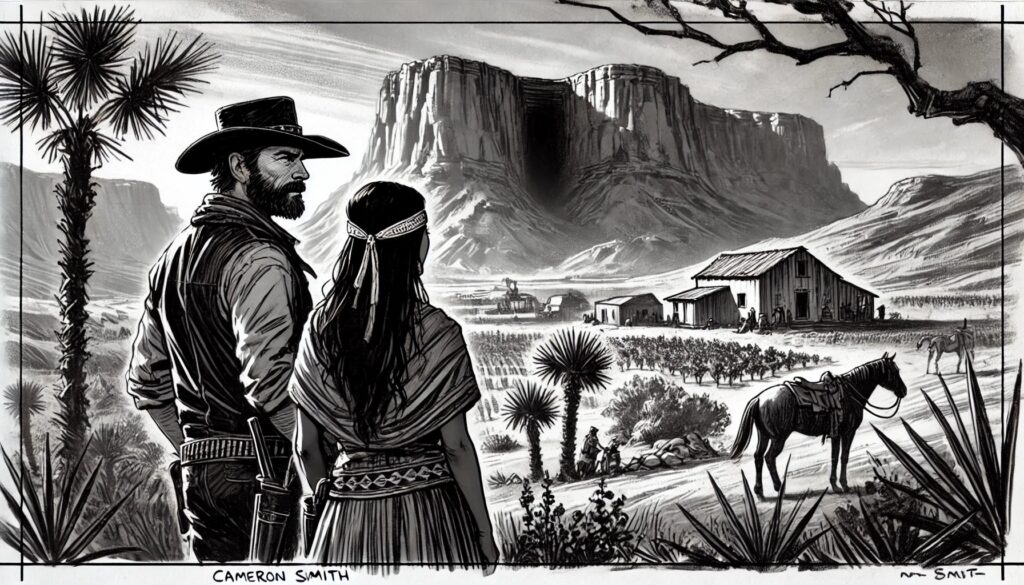
EXT. SHIP MOUNTAINS – NIGHT
A PICKAXE STRIKES ROCK. Gold dust shimmers in the dim lantern light. Cameron works with his small crew, his hands raw and blistered.
-
EXT. BARCO HOMESTEAD – 1853
Wilbur, now 11, and his younger brother Emmett, 9, help their father. Sweat drips from their brows as they shovel ore into a cart. The weight of secrecy is heavy on their shoulders. The youngest brother Jackson, now 7, helps his mother pack the cart, hiding the gold under sacks.
- INT. FEDERAL LAND OFFICE – SAN FRANCISCO – 1855
Cameron, dressed in his best coat, hands a lawyer a stack of gold coins. The lawyer barely nods, counting them with cold efficiency. Justice is expensive.
-
EXT. SHIP MOUNTAINS – 1856
More prospectors arrive in Cadiz. Their camps spread like disease. Cameron watches from a ridge, his rifle slung over his shoulder. The land is tightening around him.
-
INT. COURTROOM – 1857
A judge reads from a document. Cameron stands stiff, his face lined with the toll of the years.
JUDGE
The claim remains under review.
-
EXT. SHIP MOUNTAINS – 1858
Wilbur, now 16 and Emmet, now 14, now strong young men, haul buckets of crushed rock. Their father works beside them, slower but relentless. They no longer need to be told what to do. The youngest brother Jackson now 12, writes entries in a LOG BOOK by candle light as his mother watches and dictates the transactions.
-
EXT. FEDERAL COURTHOUSE – 1859
Cameron walks up the courthouse steps in San Francisco with his lawyer. Cameron boots are worn, his coat patched but clean. He has spent eight years fighting, mining, surviving.
-
EXT. BARCO HOMESTEAD – SUNSET (1859)
Cameron returns home. Malika watches from the doorway, sensing the weight in his step. His battle is not over, but tonight, he is home.
MALIKA (V.O.)
The land was ours before their ink. But ink has power. And we are running out of time.
The desert wind howls. The sun sinks behind the mountains. The next fight is waiting.
INT. SAN FRANCISCO – GOVERNMENT OFFICE – DAY (1859)
A grand but imposing government office. The air inside is thick with the scent of ink and bureaucracy. Rows of desks, clerks scratching away at documents—this is where battles are won and lost without a single shot fired.
Cameron Smith stands before a heavy oak desk. His lawyer, a shrewd man in a well-pressed coat, lays a thick stack of documents before the U.S. LAND OFFICIAL.
The Land Official barely glances up. He adjusts his spectacles, flips through the papers, and exhales as if he’s already made up his mind.
LAND OFFICIAL
This grant is Mexican. Under U.S. law, it must be proven valid.
SMITH’S LAWYER
I have the original diseños right here, your honor. Witnesses. And my client’s rights as a U.S. citizen.
LAND OFFICIAL
(frowning) This grant is for Cameron Herrero. His name is Smith.
Cameron tightens his grip on his hat. He has fought men with guns and knives, but this is a different kind of battle—one where words are weapons and men kill with ink.
SMITH’S LAWYER
Herrero is Smith in Spanish. Your honor… the Mexican clerk translated his name. You know how sloppy the Mexicans are, right? This document is legal and binding.
From the side of the room, a new voice cuts in.
RAILROAD LAWYER
And yet, there’s a new claim filed against it. The Southern Pacific Railroad has an interest in this land.
Cameron stiffens. His eyes narrow as a tall, impeccably dressed man steps forward. COLLIS P. HUNTINGTON. A man who owns everything he touches. He leans against the desk, the hint of a smile curling his lips, as if this is already settled.
HUNTINGTON
The government needs infrastructure, your honor. This land would serve the country better fueling locomotives than lining Mr. Smith’s pockets.
Cameron steps forward. The tension in the room shifts.
CAMERON
I settled this land. Cultivated it. Defended it. And I hold the original Mexican grant that U.S. law is bound to uphold.
LAND OFFICIAL
(raising a hand) Sit down, Mr. Smith. You’ll have your chance.
The Land Official exhales, rubbing his temples. He leans back, considering the papers before him.
LAND OFFICIAL
True, Mr. Smith, the Treaty of Guadalupe Hidalgo does require us to recognize Mexican grants…
A pause. His tone shifts.
LAND OFFICIAL
But only if they were valid under Mexican law.
RAILROAD LAWYER
(grinning) Which, as you know, can be difficult to prove—without the right documentation.
Cameron reaches into his leather satchel. He pulls out a worn, leather-bound LOG BOOK and slams it onto the desk. The sudden sound makes even the clerks look up.
CAMERON
Here’s my proof.
He flips the book open—inside, years of meticulously kept records.
CAMERON
I have my legal land grant, crop production logs, and trade agreements with Tucson and San Diego. And I have witnesses who will testify.
The Land Official hesitates. Huntington leans in, voice low, barely above a whisper.
HUNTINGTON
(calm, calculated) Sir, do not sign. The railroad needs that water, and the railroad gets priority.
Cameron sees the exchange. He sees the corruption at work, the backroom dealings that decide men’s fates. He isn’t done. He reaches into his coat and slaps down two more documents. His Birth Certificate. A letter of commendation from the President of the United States for his father’s Naval service.
CAMERON
Sir, my family fought and died for this country. I was born in the Cradle of Liberty, Philadelphia.
CAMERON
I legally settled this land. I’ve fought to keep it from prospectors, railroad men, and thieves. And I’ll fight you too.
CAMERON
(leaning in, voice steel) If I have to go to Washington D.C., I will. I will fight.
CAMERON
(with finality) Sir, I own this land.
A long silence. The air is thick with the weight of the moment. The Land Official glances between Cameron, the lawyer, and Huntington. The room is still. Cameron sees the hesitation in the official’s eyes. Finally, the Land Official sighs. He reaches for his pen.
LAND OFFICIAL
Mr. Smith, based on your documentation, your claim… is approved.
A beat. Then, the ink touches paper. A signature is scrawled. The land is his—for now. Huntington’s expression doesn’t change. If anything, he looks amused.
LAND OFFICIAL
(soft, almost pitying) I’ll send this to Washington for the President’s Signature. Good luck, Mr. Smith. You’re going to need it.
Cameron exhales, gripping the papers tightly. He has won today. But he knows this fight isn’t over. Outside, the wind howls through the streets of San Francisco.
EXT. SHIP MOUNTAINS – CLIFFHANGER LOOKOUT – NIGHT – 1859
The desert glows in silver and shadow. CAMERON SMITH stands at the edge of the plateau, surveying the darkened valley below. MALIKA steps beside him, their sons—WILBUR (17), EMMET (15) lean and strong, and a younger brother, JACKSON (13)—stand just behind.
The land stretches endlessly, a hard-won kingdom of sun and stone.
MALIKA
It is yours now.
CAMERON
This mountain is ours.
EXT. MOJAVE OASIS HOMESTEAD – DAY – 1859
On the horizon, dust rises. The faint sound of hooves. A U.S. CAVALRY patrol crests the ridge to the south—uniforms glinting, a flag snapping in the wind.
MALIKA
More men are coming.
CAMERON
They always do. (beat) What do they want this time?
The patrol breaks through the dust. At its head: LIEUTENANT WILLIAM T. SHERMAN, now seasoned, calm-eyed. They dismount near the water’s edge, letting the horses drink from the spring.
CAMERON and WILBUR approach the patrol. SHERMAN dismounts, his expression relaxed, but shaded with purpose.
SHERMAN
Smith. I understand your Land Patent finally came around. Signed by Buchanan himself. You must have some powerful allies back East.
CAMERON
They had no choice. I had the maps, the crops, the signatures. And I had the law.
SHERMAN
(smiling) That’s rare out here. I’ve seen too many lose everything trying to prove what they already earned.
He nods toward the homestead and fields.
SHERMAN
You’ve built something, Smith. Not just with your hands—but with your head.
WILBUR stands tall beside his father, curious. SHERMAN notices him.
SHERMAN
Your boy is all grown up now.
CAMERON
Yes, this my eldest—Wilbur.
SHERMAN
You’ve got your father’s shoulders—and your mother’s eyes, I think.
WILBUR offers a polite nod. SHERMAN studies him for a beat—measuring something.
SHERMAN
War is brewing back East, the wheels are turning fast. The Union could use more sons of Philadelphia. Men who understand what’s worth keeping together.
He lowers his voice just enough for it to land heavier.
SHERMAN
We’re going to need good men—young men with grit.
MALIKA (O.S.)
He is not for your war.
MALIKA steps forward, quiet but firm, standing beside Wilbur. Her presence halts Sherman’s momentum. A long silence hangs between them.
SHERMAN nods, respectful. He steps back and tightens his saddle strap, gaze distant now.
SHERMAN
Don’t worry son, you don’t have to decide today.
Turning to Cameron.
SHERMAN
This country’s going to tear itself apart. And when it does… (beat) men like us will have to choose which side to stand on.
He mounts his horse. The patrol begins to move. CAMERON watches him go with a quiet understanding. WILBUR stares at the horizon where the soldiers disappear—his jaw set, his thoughts already shifting.
MALIKA (V.O.)
The desert had given us peace. But peace is like water—it cannot hold against the wind forever.
As dusk falls, the family stands together, the oasis behind them, the unknown ahead.
FADE TO BLACK.

